#I think the latter subsets are questionable at the best of times
Explore tagged Tumblr posts
Text
Very dispassionate and clinical poli sci/conflict theory thoughts on a dark and emotionally charged topic here, regarding the tragic death of Aaron Bushnell: Others have pointed out the self-immolation, regardless of our feelings regarding the act, have on a quantitative level been not very successful at actually bringing about the political aims of those who carry out such acts. I agree with the evidence, it speaks for itself; however, I also think Aaron Bushnell's death appears somewhat distinct from previous case studies. The aspect of Aaron Bushnell's self-immolation that I do think is worth pointing out as somewhat unique to other self-immolation cases, is that he was a member of the organization (i.e. the US Armed Forces/U.S Government) whose behavior he was seeking to change, whereas most previous cases were appealing to either indifferent but powerful third parties, or their opponents themselves. The US climate scientist who immolated himself on the SCOTUS building plaza back in April 2022 wasn't a judge or a worker in the fossil fuel industry, for example. If your political opponents literally set themselves on fire, one would predict just carrying on carrying on, as has been the case in other self-immolation cases. That has not yet been demonstrated as the case when its 'your own' performing public and ghastly suicides - least of which because it evokes all the actions they could have taken as alternatives that most people would not.
In Bushnell's case, his self-immolation invokes the specter of a great many alternative actions he could have performed. Dying as painfully and as publicly as he did, by his own hand, suggests he did not fear punishment or sanction - how much damage could a cyber-defense analyst like Bushnell do if his principles convinced him he needed to undermine US support of the occupation in Gaza via sabotage, espionage, etc., indifferent to the personal peril involved? It arguably adds an entirely new dimension to the political calculus surrounding Gaza: how long can we support the siege if it creates the risk of another Aaron Bushnell? Especially if the next Bushnell is not content with only harming themself, and wishes to strike out against Americans or Israelis as well.
#aaron bushnell#i/p conflict#hopefully this strikes the right balance of discussing bushnell's death charitably without delving into valorization or hero worship#I think the latter subsets are questionable at the best of times#and so best refrained from in discussing the martyrdom of a real breathing person#might delete later idk
9 notes
·
View notes
Text
Theory: Eldred is not Cardan's father
Listen. I don’t know if anyone has said this before, but I’ve been mulling this over for a while now, so I’m going to throw it to the void before The Stolen Heir comes out, for posterity.
Buckle up, folks and Folk. I’m monologuing.

(PLEASE DO NOT INCLUDE TSH SPOILERS IN THE COMMENTS/REBLOGS/TAGS AS I HAVE NOT READ IT, AND WILL NOT BE ABLE TO READ IT UNTIL 8th JAN 2023!)
A big caveat of this theory is that I have basically no solid evidence for this apart from a few faint dots vaguely connected through a strange fog. But I am nothing if not someone who will scrounge around in the dirt for answers. So let’s get some filth under our fingernails.
(I promise it will maybe make sense. Eventually)
I. EPISTOLARY SEMANTICS
Much of this theory centres around the note Jude steals for Dain from Hollow Hall in The Cruel Prince. It reads:
“I know the provenance of the blusher mushroom that you ask after, but what you do with it must not be tied to me. After this, I consider my debt paid. Let my name be stricken from your lips.” (TCP, p.115)
There are so many layers to this note, but I’ll start on the surface level before digging deeper.
When Jude gives the note to Dain, he reads it, then says, “So he’s blackmailing Queen Orlagh” (TCP, p.123). During a first read, one would think Dain is implying that Balekin is blackmailing Orlagh, since Jude stole the note from Balekin’s study, and that Orlagh is the one who wrote the letter to the eldest Greenbriar child.
And no one questions it, because Jude even makes this supposition herself.
But my question is this: Why would Balekin be blackmailing Orlagh? We learn in The Wicked King that they are very much allies, and as far as I’m aware, blackmailing isn’t something you typically do to your allies.
My other question is: Why do we assume that Orlagh is the one that wrote the letter? Because Dain said so? We know him to be unreliable at best, manipulator at worst.
During a second read, one might realise that Dain is in fact being tricky here. He knows exactly who and what this note is referring to. But he’s deliberately trying to lead the Court of Shadows to the wrong conclusion, because the right one would reveal his guilt, as shown in the latter part of The Cruel Prince when Jude figures out Dain poisoned Liriope with blusher mushroom.
The way Dain is able to lead us off track without lying is through implication alone. This is why he’s not specific about who is blackmailing Orlagh. He just says someone is (a likely statement, considering Orlagh’s title) and that someone might be a man (plausible enough).
Thus, the sentence “He’s blackmailing Orlagh” can still be a perceived truth, and we are only ascribing it to the note because it is the closest context.
But we find out later that Dain’s statement has nothing to do with the note, since the note is about Liriope’s poisoning.
After having read TCP [redacted] times, one might begin to think: Is Orlagh even the sender of this correspondence? And if not, who is? And what does the note mean if we’re giving it a different context/sender?
For this, we have to peruse the parts of the sentences written in the note.
A. “Provenance”
For me, this phrase has always seemed a bit strange when referring to blusher mushrooms.
The word “provenance”, as most people recognise it, is used to describe the place from which a particular thing or subset of things comes from (i.e. the provenance of “Champagne” is Champagne, France, and the provenance of “Iranian rugs” is Iran, etc.).
So when we put it in the context of blusher mushrooms, as the note does, it seems to be saying there is a particular place where one can find blusher mushrooms, and the recipient is trying to acquire them for one reason or another.
But Jude, when first dabbling in mithridatism, describes picking blusher mushroom in the palace gardens (p.148-150, TCP). So if Balekin was planning on acquiring the poison, he needn’t look farther than the palace itself.
Which says, to me, that acquiring blusher mushroom for his own purposes wasn’t the subject of Balekin’s original inquiry, since it is common enough for a seventeen-year-old girl to find on her walk to school.
Additionally, the sender says “the provenance of the blusher mushroom”, when “the provenance of blusher mushroom” would be more grammatically correct if the sender was indeed informing Balekin about where he could get the poison.
Implying that they are referring to a single specific blusher mushroom. Perhaps, the very one which poisoned Liriope.
Which means, “provenance”, as it is used in the note, could be referring to the less common definition: “record of ownership”.
My guess is, Balekin asked the sender of the note if they knew who killed Liriope with blusher mushroom. The sender, wanting to remain cryptic in case the message was intercepted, phrased their confirmation so only the person who knew the full context of the message would be able to understand it.
Leading me to believe the sender may be saying, “I know who owned/used the blusher mushroom that you’re asking about”.
B. “It”
Here’s another tricky thing about English grammar: sometimes the subject that “it” refers to can be a group of things.
We might assume right off the bat that “What you do with it” means “What you do with the blusher mushroom”. But, given the previous specification, our sender might actually just mean “What you do with this information must not be tied back to me.”
Essentially, “Don’t tell anyone I told you this but I know who Liriope’s murderer is.”
C. “Let my name be stricken from your lips.”
To me, this last sentence of the note wreaks of faerie bargain.
The sender mentioned they had a debt to pay Balekin, and after divulging who poisoned Liriope, they would consider that debt paid.
But why not just leave the message at that? They already basically said, “Don’t tell anyone I told you this”, so this sentence seems redundant if not included for an ulterior purpose.
It could be a dramatic sign off. More likely, though, it’s a final clause of some bargain made previous to this message. Such as, “You owe me. Tell me who poisoned Liriope and I’ll never speak your name again.”
Either way, it sounds like the sender does not want to be tied to Balekin in any way (understandable tbh).
***This line is important for later, so remember this.***
~~~
So, after these specifications have been made, the note reads:
“I know who owned/used the blusher mushroom to poison Liriope, but what you do with this information must not be traced back to me. After this, I consider my debt paid. As per our bargain, you’re not to speak of me again.”
II. THE SENDER OF THE LETTER
There are many people who could’ve sent this letter. So let’s narrow it down.
Since the letter is in Balekin’s study, we could surmise that it is something Balekin has written and plans on sending. But Jude describes it as being written in “an elegant, feminine hand” (TCP, p.115).
Which doesn’t necessarily rule Balekin out as the sender, but I’m thinking it is much more likely he is the recipient, and that the sender is a woman.
The sender also knows who killed Liriope, so they probably know why Liriope was poisoned, as well. Meaning, they would have had to have ties to her—whether in proximity or in intimacy.
Oriana mentions in TCP that she and Liriope were close friends. She also tells Jude that she knew about Liriope and Dain’s affair.
However, in this same conversation, Jude asks Oriana if she knew Dain was the one who poisoned Liriope, and this is her response:
“Oriana shakes her head. ‘Not for a long time. It could have been another of Eldred’s lovers. Or Balekin—there were rumours he was the one responsible. I even wondered if it could have been Eldred, if he had poisoned her for dallying with his son. But then Madoc discovered Dain had obtained the blusher mushroom. He insisted I never let Oak be anywhere near the prince.’ ”(TCP, pp. 294-295)
Since faeries cannot lie, the truth must be that Oriana is not the one that knew who poisoned Liriope.
And since the letter is left unsigned, Dain attributes its origins to the Queen of the Undersea.
Here’s why I don’t think Orlagh sent this message:
Orlagh is seen in cahoots with Balekin plenty throughout the series. Yet, the sender of this message implies they want nothing to do with the eldest prince, and furthermore explicitly tells Balekin to never speak their name again. If Orlagh were the sender of this note, we would not have much of the scenes which take place in the Undersea during Jude’s kidnapping in The Wicked King.
Orlagh is the Queen of the Undersea. Why would she know or care about the details of a murder of one of the High King of Elfhame’s lovers?
Orlagh also has no ties to Liriope, or Dain for that matter, so why would Balekin go to Orlagh for information regarding Liriope’s murder?
But do you know who does have ties to Liriope, who might also have reason not to want Balekin to speak their name ever again?
Lady Asha.
So how exactly does Lady Asha have ties to Liriope?
It is common knowledge that they were both lovers of the High King. Asha could’ve known of Liriope’s affair with Dain because of their proximity at court. She was also known for being a lover of gossip and secrets. It’s not too surprising that she might know of Liriope’s secret.
But how does Lady Asha know that Dain specifically poisoned Liriope? And why might she want to sever her ties with Balekin?
Let me back track for a moment.
III. EMERALDS FOR HEIRS?
In the prologue of The Queen of Nothing, Lady Asha receives a heavy necklace of emeralds for her “contribution to the Greenbriar line”.
In The Cruel Prince, when Jude is dressing in Liriope’s clothes for the party at Locke’s estate, Locke offers her his mother’s jewels, specifically a heavy necklace made of emeralds (TCP, p. 168).
At first, when I noticed this connection, I thought emeralds must be Eldred’s standard gift given to any mother who births a Greenbriar heir.
But if you recall, Locke wasn’t born to Eldred, and Liriope would have had to receive the necklace while she was still alive, meaning Oak had not yet been born.
It is significant that both of these women have necklaces of emeralds, for the meaning of emeralds—amongst loyalty, love, and strength—is truth.
“A revealer of truths, emerald reputedly could cut through all illusions and spells, including the truth or falsity of a lover’s oath.” (International Gem Society)
Indeed, it’s curious that the only other person known to possess a string of emeralds similar to the one Lady Asha receives in QON, is Liriope.
Liriope, who, to common knowledge, never had a royal child with the High King. Liriope, who, through the events of TCP, we know to have been having an affair with Dain while still in the High King’s favour.
Liriope, who, like Lady Asha, met an unfortunate fate.
If emeralds represent the falsity of a lover’s oath, and Liriope possessed such a necklace before her passing, it could be that the emeralds Asha received were less a gift as much as they were a warning.
One that Asha was either too arrogant or too oblivious to figure out when she first received them, but that she might've pieces together after Liriope's death.
IV. PUNISHMENT BY PROXY
In the prologue of Queen of Nothing, the narrator informs us that Cardan’s punishment for “killing” a mortal man was that his mother was locked in the Tower of Forgetting.
It’s unsurprising that a mother should shoulder the blame for the crimes of her royal son, but this seems like a steep price to pay for the death of someone only tangentially related to the High King’s concerns.
It wasn’t even a lover of Eldred’s own who was killed. It was the lover of his lover/seneschal.
Incarcerating Asha because her son allegedly killed the lover of the High King’s lover feels like an overreaction. Why not simply cast Asha from the court? Or send her to the mortal lands?
Unless…
The High King suspected (or knew) that Lady Asha had committed some other serious offense against him, but had no sufficient evidence to lock her away. Or perhaps he did not want to risk the humiliation that would ensue if everyone at court found out that Lady Asha had been dallying with his son at the same time as she was his own lover.
And, to give her what he thought she deserved without inciting speculation from the court, used the excuse of Cardan killing the mortal to finally serve justice.
Furthermore, we know Cardan and his mother were not close. We know Asha did not raise Cardan as normal mothers do. Why is sending Cardan’s mother to prison a punishment to him?
Other than a small blot on his reputation (upon which, there are many, much larger blots), Asha’s punishment by proxy largely shouldn’t effect Cardan.
It seems as if Cardan’s true punishment was being virtually disowned by his father, and banished from living in the Palace of Elfhame.
Meaning, Asha’s punishment wasn’t really Cardan’s, but her own.
V. THE DEBT
In the letter Jude stole from Balekin’s desk, a “debt”, which has been paid through the information provided, is mentioned. If Asha sent this letter, what debt could she possibly owe Balekin?
Well, for starters, he did raise her son when no one else would.
Though, it’s unclear to me when in the timeline Asha wrote the letter and when she was imprisoned, if this is the aforementioned debt, Asha would’ve had to have written the letter after she’d been sent to the Tower of Forgetting. Because her being sent to the Tower was the catalyst for Balekin raising Cardan.
This debt also begs the question: Why would Balekin offer to raise Cardan?
Surely having Lady Asha, an incarcerated ex-lover of the High King, in his debt isn’t so valuable as the immense responsibility of raising a child he has no obligation to.
Which points to a motive that indicates perhaps Balekin does have an obligation to this child.
When Madoc kills Eva and Justin in the prologue of TCP, he takes Jude and Taryn in, claiming it as his “duty” after he rendered them parentless. We know the fae value their honour, and so even someone as opprobrius as Balekin might be subject to upholding duty in the face of a faerie child’s mother being sent to prison.
But as we know, he did not cause Lady Asha’s detainment (Dain did). So where is this sudden sense of duty coming from? None of the other Greenbriar siblings seemed to have the same moral inclination.
Balekin taking Cardan in could be purely out of selfish motives. Such as, being able to shape Cardan to his will, which he might then use in a potential coup.
But it could be that, through everything, Balekin has an inkling of an idea that Cardan might not be his brother, but his son.
There is another debt which is possible in relation to the letter if it was sent prior to Lady Asha’s imprisonment. But for this, we must consider why Lady Asha would want her name to be stricken from Balekin’s lips in the first place.
The most obvious answer to this which I could think of is that Lady Asha knows she has committed treason by sleeping with Balekin, the High King’s son, and claiming their child as one of the High King’s own, staking her place at court as higher than is deserved, while also playing the High King for a fool.
So the debt could simply be that Lady Asha, seeing what happened to Liriope and knowing what happens to lovers of the High King after being found adulterous, wanted Balekin to never be able to speak of their affair ever again.
Balekin, not being of the sort to do things for other people without a price, might have said that he’d agree to this if she offered him information that he wanted. After she gave it to him, their bargain would be complete, and Balekin would henceforth never be able to speak Lady Asha’s name.
Regardless of which debt is the truth, indeed, I do believe we do not hear Balekin utter Asha’s name once throughout the course of the series. Despite the fact that it is almost certain they knew each other before.
VI. PRIOR ENTANGLEMENT
How do we know that Asha and Balekin knew each other well enough to be sending letters like this back and forth to each other, if we are not yet certain that they had an affair?
In the prologue of TCP, Madoc states that he didn’t believe it when Balekin told him his wife and child were not dead, but living in the mortal world. This indicates that Balekin had knowledge of how Eva faked her death.
Now, we could owe this to the presence of spies at court. It’s likely that Balekin has his own hoard of spies, as do most of the prominent figures in Eflhame.
Or we could consider that perhaps Lady Asha, who is the other person confirmed to have known that Eva faked her death (TWK, p.129), was Balekin’s informant on this matter.
After receiving this information, he was then able to pass it on to Madoc in order to gain his trust (with the ulterior motive that Madoc might trust him enough to help him with his coup).
But then, we must also consider why Lady Asha would tell the eldest prince of her friend’s plan in the first place.
One thought I had was that perhaps Balekin, having a slew of mortal servants under his roof, was the person who offered Eva the unidentifiable mortals left in Madoc’s house as “proof” of their death.
He’d have to have motive to do this, however. Which indicates he either had some sort of attachment to Asha, who was trying to help her friend escape Faerie, or Balekin valued the knowledge of their plan enough to help them carry it out.
Another less complicated motive for Lady Asha telling Balekin of Eva’s escape would be that Asha and Balekin had a history of being in cahoots with one another, which would point to a connection deeper than a passing acquaintanceship due to proximity at court.
VII. AN UNCANNY LIKENESS
It is a truth in The Folk of the Air series that children look very much like their biological parents.
Oak, biological son of Dain, looks an awful lot like Dain:
Oak is described as having deer legs, little horns on his head, and brown hair with streaks of gold.
Dain, in turn, is described as having deer legs, little horns, and golden curls.
This striking resemblance is what initially got me thinking on Cardan’s parentage. And it is further backed by the many other child-parent resemblances in the series:
Vivi is described as having inherited her father’s golden cat eyes and fur-tipped ears.
Locke has obviously inherited his mother’s ���sunrise hair”.
And it could be argued that Oak inherited Liriope’s “starlit eyes”, as his are an amber-gold colour that might resemble an old star.
Lady Asha even states that Jude resembles both Eva and Justin greatly (TCP, p.129).
And in kind, Jude thinks that Lady Asha and Cardan look very alike, though she does not admit to this out loud.
These likenesses do not necessarily indicate anything other than a pattern, which could be total coincidence. But it does mean that we could reasonably conclude that faeries, as with humans, often take on characteristics of their parents.
Balekin is described as having black hair, pale skin, and silver eyes.
Cardan’s description in the series is quite similar:
He is said to have black curls, pale skin, and metallic-rimmed black irises.
When we compare that to Eldred’s description—golden hair and bronze owl-like eyes—it doesn’t seem like Cardan inherited many traits from the High King at all.
Now, this could be because Lady Asha’s characteristics were more dominant in Cardan’s inherited genes.
She is described as being pale, with raven hair, and black eyes. She also clearly passed her tail on to her son.
But the similarities between Cardan and Balekin go beyond the obvious. When Jude is hiding under a chair in Balekin’s study, she notices the following:
“In two strides, Balekin is in front of his brother. They look so alike standing close. Same inky hair, matching sneers, devouring eyes.” (TCP, p.119)
Indeed, this resemblance is echoed across the series. In The Wicked King, when Jude goes to visit Balekin in the Tower of Forgetting, she states:
“As I ascend, I glance back at Balekin’s face, severe in the green torchlight. He resembles Cardan too much for my comfort.” (TWK, p. 26)
And again, in the Undersea, when Balekin comes to interrogate her, Jude thinks:
“They have the same black hair. The same cheekbones.” (TWK, p. 240)
There is also the matter of Cardan’s name, which bears resemblance to Balekin’s physicality.
Balekin is described as having thorns on his forearms. Cardan is a name which is derived from Cardon, which means thistle. Thistles are a prickly flower that grow from stems of thorns.
We know Holly Black is very intentional with her descriptions and words. My question is, why would she go out of her way to draw these physical comparisons, to echo the sentiment that the two are strikingly similar, if Cardan and Balekin were merely brothers?
She could have said that Cardan, being raised in Balekin's household for much of his formative years, was moulded to adopt his brother's mannerisms and propensity for cruelty. She could have said the way that they talk, walk, carry themselves, etc. were extremely reminiscent of one another, and we as readers would've gotten the point: that Jude thinks Cardan and Balekin are alike in many ways.
But this isn't what Holly Black does. Which leads me to believe there is something else to the constant parallels she chooses to include.
VIII. IN CONCLUSION
I’m aware this entire post reads like a conspiracy theory. So to those of you who stuck it out this far, congratulations and welcome to the circus.

I’ll be the first to admit that it is a big reach to say that this is fact rather than the speculation that it is. There are a lot of holes, which I can only hope might be filled in the coming duology.
That being said, this theory brings many questions to light.
How would Balekin know of Eva’s escape without having a more intimate relationship with her friend than previously thought?
Why would Lady Asha want her name stricken from Balekin’s lips so desperately as to make a bargain with him?
How could Lady Asha possibly be indebted to Balekin?
Why would Liriope and Asha be the only two characters with heavy necklaces of emeralds on their person if it didn’t mean they shared a similar history with the High King?
Why would Holly Black continuously compare Balekin and Cardan, indirectly pointing out that neither look much like their father or other siblings, but look undeniably like each other, if not to draw a deeper connection between the two?
And finally, and perhaps most importantly, if Lady Asha’s dalliance with Eldred was so brief—as is confirmed by Oriana in chapter 12 of QON— how did she come to be pregnant by him? We know faerie menstrual cycles don’t happen as often as mortals’.
Is this as simple as good luck, or does it speak to an affair no one knew was happening?
–Em 🖤🗡
more theories & analysis
#this is. complete speculation ngl gvskdjsk#i have a whole conspiracy theory red string board for this one though#tfota#jurdan#cardan greenbriar#jude duarte#balekin greenbriar#lady asha#the folk of the air#jurdannet#the cruel prince#the wicked king#the queen of nothing#queen of nothing#holly black#judecardan#how the king of elfhame learned to hate stories#tfota meta#tfota analysis#my analysis
912 notes
·
View notes
Text
I'd like to talk about the latest Pokemon Center plush line!
I tend to avoid official nintendo merch, because I give that company enough of my money already. But White was the first Pokemon game I ever played (after saving my allowance for months for it and a used DS lite), so I have a very special place in my heart for gen5/Unova pokemon. When I heard they were releasing a line of Unova "Sitting Cutie" plushes, I wanted to at least check it out.
And I did! And I mildly disappointed my wallet! There are some bangers in here! But there are a lot of... decidedly un-bangers. Tippy-tappers at best. So I wanted to take the time to walk you through some of the ways this line fell short of its central claims: namely, Sits and Cuteness.
"Sitting"
I'd first like to address the distinguishing claim of the line; that each of these plush can sit up unsupported (or, more generously, could be propped up stably).
It would be easy to only give examples of pokemon that shouldn't have been considered for this line at all, of which there are many:
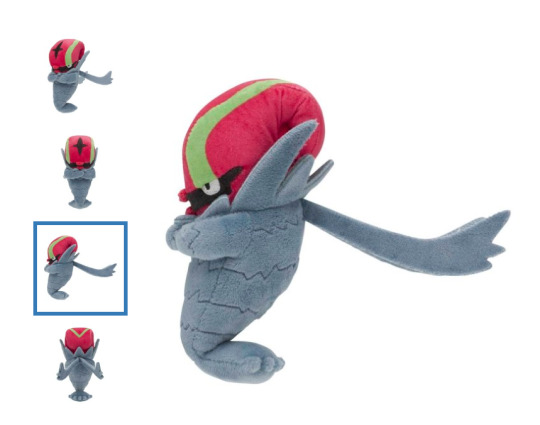


fig. 1) in what universe, praytell
But there were many more that were so, so close to plausibility in the face of physics, that really only needed a modified design direction.
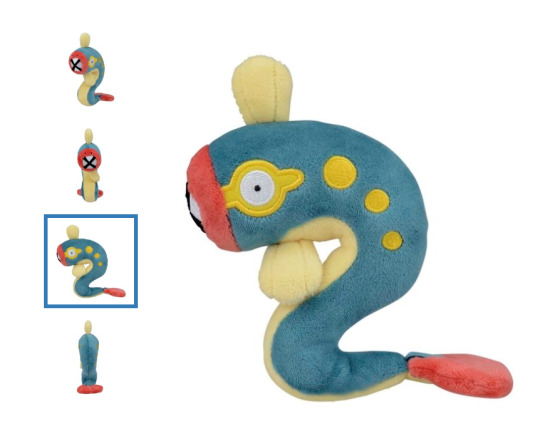

Let's compare Eelektrik (left) to Serperior (right). Eelektrik is extremely top-heavy and prone to tipping, problems which could perhaps have been mitigated by a coiled design (like Serperior), or even as a flat. It could be argued that the current form stays true to the original art, which should always take precedent. I see you, and I hear you, and I disagree
A skosh below the "no way in hell" category of sittability, lay a group of lesser design sins broadly defined as "questionable in the face of a stiff breeze." For many plush in this category, the product designers could learn a thing or two from Toxel:

fig. 2) a well-balanced bean
Put another way, the popular rule-of-thumb "four on the floor," most commonly begged for in the context of starter evolution lines, may be applied to great effect:
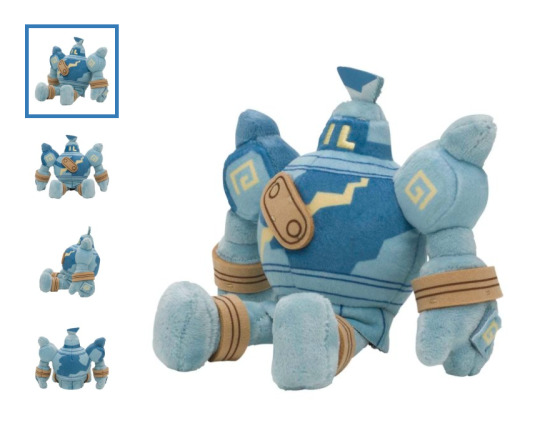
Top-heavy Golurk? Four on the floor!

Tall, spindly, misguidedly "source-accurate" Genesect? Four on the floor!

Think of his poor Tepiggy spine! FOUR ON THE FREAKING FLOOR


Purrloin, look! Your big sibling has it down! Get at that generational knowledge, girl!
"Cuties"
I'm not aware of a single official merch line in existence that lacks at least one cursed artifact. Plush are particularly susceptible, and this line is no different.
While I have to give the designers props for a perfectly lovely Mienshao, they canonized my bestie as having a cringe childhood:
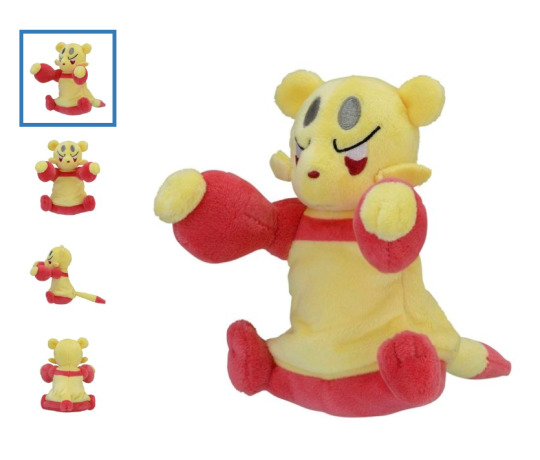
All this Mienfoo wants are uppies. How's she gonna kick ass when her feet go straight into her torso? Her glowup will never come if she can't even land a pound.
Entire evolution lines fell prey to design decisions here. Please compare gen5 Elgyem and Beheeyem to their inbred and deformed purebred domesticates:
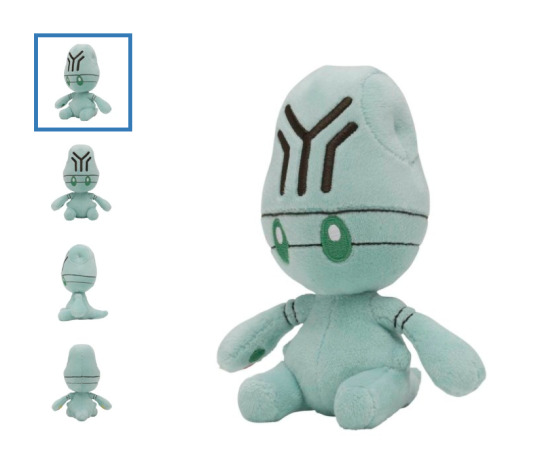
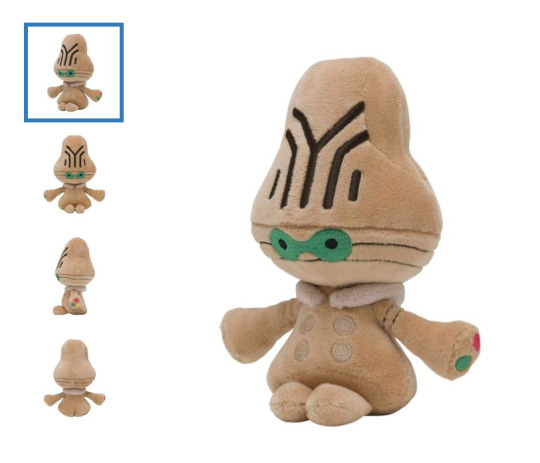
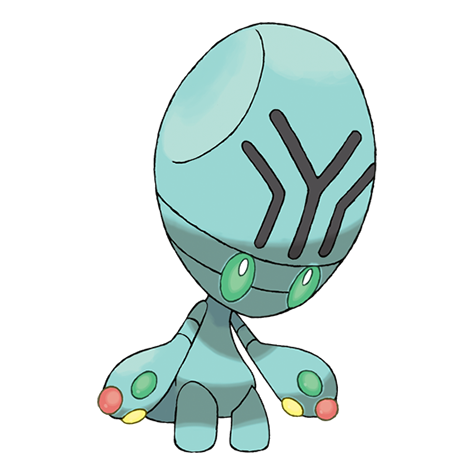
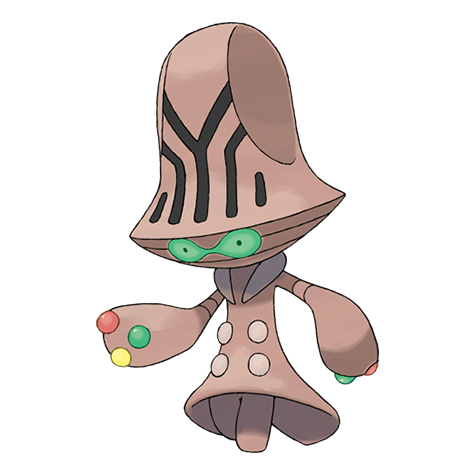
fig. 3) has IV breeding gone too far?
Let us also more closely examine the full Sandile evolution line compared to wild type examples, as I consider these among the least forgivable offences:


Why is the plush Sandile so sad? Perhaps he knows what is to come.


Where sass? Why snoot so droop????


NO MY CREATCHURE?????? NO NONONO NOT THE SNOOT!!!!!!!
figs. 4-6) look how they slaughtered my boy
Finally, I would like to highlight a subset of the line that has Witnessed The Horrors. These are more subjective in their cuteness. You know the saying; one man's uncanny gremlin is another man's terrified blorbo.
Meet Drilbur, who has recently Seen Some Shit!


fig. 7) the boy who inspired this post, with WT reference
The bug-eyed-ness is what tips this into horror movie prop for me personally. I should not be able to see both his eyes from a diagonal. I could understand how some people could find him endearingly goofy, but my litmus tends to be: would I be amused to open my eyes to see him in the dark at 3am, or would I shit my pants? Drilbur here leans towards the latter.
Here is an example of a shell-shocked friend I find cute:
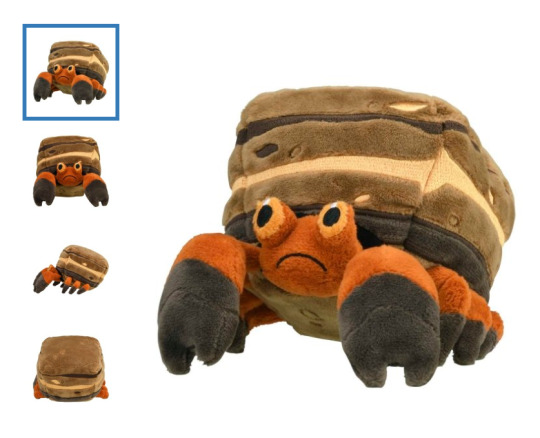
Crustle, normally hiding safely under their rocky shell, is leaned back to fulfill the barely-followed criteria of "sits," and so turns their eyes to god to ask why he has forsaken them. I love it.
BONUS CONTENT: KERMIT DEINO!!!!

:D
#pokemon#plush#plushies#nintendo#unova#pokemon gen five#sitting cuties plush#eelektrik#golurk#genesect#tepig#mienfoo#purrloin#elgyem#beheeyem#sandile#krokorok#krookodile#drilbur#crustle#deino#cursed plush#cursed merch#pokemon center#long post
36 notes
·
View notes
Text
You know, at this point I think it may be useful to talk about the difference between highly structured religions and high-demand religions, because I realize the terms sound very similar but have very different meanings, which may be confusing for newcomers.
Highly structured religions are exactly that -- religions with a lot of internal structure. That structure may take the form of othrodoxy (authorized theory or practice) and/or orthopraxy (correct conduct or action). It may take the form of very formal, highly structured rituals -- the Catholic mass is a good example of this type of formal ritual. It may even take the form of a system of authority, such as clergy. None of this is inherently good or bad, and many people find highly structured religions have a deep, positive effect on their lives.
There are several pagan religions that are highly structured, including Traditional Wicca/British Traditional Witchcraft, Thelema, and many forms of Hellenic, Roman, and Kemetic reconstruction. These are all beautiful and meaningful faiths that enrich the lives of their followers. High structure is simply one of many approaches to spirituality, and if that’s how you best connect to the divine, more power to you.
High-demand religions are a subset of high-demand groups, a.k.a. cults. These groups are about control, not structure. Members are asked to give unhealthy amounts of time, energy, and emotion to the group, until they lose touch with their individual identity and become lost in the group identity. The Church of Jesus Christ of Latter Day Saints (Mormons) is a modern example of a high-demand religion. So are Jehovah’s Witnesses. So is the Church of Scientology. These groups destroy lives, eat people up, and destroy their senses of individuality and self-sovereignty.
High-demand groups are not always religious, and the actual beliefs of the group are less important than the means used to control members. Some of the most dangerous cults in history have been non-religious -- just ask anyone who lives in the United States and has experienced the Cult of Trump. High-demand groups usually do have some sort of shared beliefs, but those beliefs may be religious, political, social, or even fandom-based.
High-demand religions may or may not employ some of the highly structured elements I mentioned earlier, but any belief system can be used as a cult recruitment tool, whether that system is highly-structured or not. Again, the markers of a high-demand group have less to do with belief and more to do with the way they treat members.
Here are some of the warning signs of high-demand groups. If a group checks off all or most of these, stay far away:
The group has a living leader whose authority is beyond question, and whom members are expected to give unquestioning commitment
The group is preoccupied with bringing in new members, often through recruitment or missionary work
The group is preoccupied with making money, or demands money beyond the basic cost of running the group (tithing is a good example of this)
Questioning, doubt, and dissent are discouraged or punished
Mind-numbing techniques such as meditation, trance, chanting, speaking in tongues, debilitating work routines, or lack of sleep are used to suppress doubts about the group and its leaders
The leadership dictates how members should think, act, and feel, including controlling dress, behavior, language, and interactions with those outside the group.
The group is elitist, claiming a special, exalted status for itself, its leaders, and/or its members that makes them “above” others
The group has a black and white, us vs. them mentality
The group’s leaders are not accountable to any human authority
The group induces feelings of guilt or shame in members in order to better control them
Members are expected to limit contact with those outside the group, possibly even cutting ties with family and friends
Members are expected to give up personal goals such as education and career goals
Members are expected to devote an inordinate amount of time to the group
This is by no means an exhaustive list, but hopefully you get the idea of what these groups are like. Stay safe out there, y’all.
Resources:
“Checklist of HDG Characteristics” from the Cult Awareness Network
Steven Hassan’s BITE model at freedomofmind.com
“The Bite Model: QAnon Analysis” on freedomofmind.com
“1442: Was I Raised in a Cult or High-Demand Religion? A Self-Assement” on mormonstories.org
Recovering Agency by Luna Lindsey
#high demand religion#high demand group#cult#cults#cult survivor#comparative religion#exmo#exmormon#ex mormon#lds#mormon#mormonism#wicca#wiccan#pagan#paganism#religio romana#hellenismos#hellenic polytheism#kemetic polytheism#thelema#kemetic paganism#heathen#heathenry#norse paganism#norse pagan#irish pagan#irish polytheism#psychology#long post
749 notes
·
View notes
Text
Jon Snow -Subversion of his Heroic Arc
Almost a year has passed since GOT was over for good and there was an outpouring of disappointment over how it ended. Some were genuinely upset about the character arcs in and of themselves, while others found some degree of acceptance because many elements probably came from Martin himself. Their arguments were more about the incoherent storylines and gaps that left out a lot of materiel about the characters.
For Dany, a subset of fans can’t get past the idea that Jon Snow killed her (something that’s almost certain to happen in the books,too). For Jon, many people were disappointed that he didn’t become King, but at the same time, at least he was left alive at the end and his arc appeared to be about remaining loyal to the Starks by acting to protect Sansa and Arya.
Martin seemed to warn in various interviews over the years that he wasn’t interested in doing a story wherein the traditional hero comes in and saves the day and makes the world right again. That seems to help explain Jon’s arc, and I’m sure its going to better executed in the books. An interesting question is exactly how did Jon’s arc as a hero go off the rails? I think the answer focuses on three important plot points (although there could be more). The first one is his own uncertainty about wanting the Throne, the second is his “star-crossed” relationship with Dany, and the third his idealism.
Jon’s Unwillingness to Rule
What is his unwillingness (a central aspect of his character on the show) all about? On a basic level it’s about a general sense of unworthiness that has permeated his life since childhood, having grown up as a bastard who doesn’t know the identity of his mother. Even though he had a privileged childhood in many respects, he is deeply wounded and has a chip on his shoulder. However his bravery, skill, charisma, and willingness to help the downtrodden still make him an attractive leader and he eventually becomes commander of the Watch. When that ends in disaster, after he has followed his conscience and done what he considers to be the right thing, he is more disillusioned and wounded than ever before. Even though he probably never had expected to become Lord Commander anyway, once he was assassinated his aversion to ruling and leading was probably only increased. This aversion stays with him for the rest of the series as he gives up his crown in favor of Dany, and then will not press his claim when he’s urged to do so by Vaerys and indirectly by Sansa.
To get to the point, it can be argued that Jon’s failure to “step up” and accept the crown in either of these two situations lead to greater disaster because it allowed Daenerys to destroy King’s Landing. In the first instance, had Jon stayed allies (instead of kneeling) with Dany (who had agreed to fight anyway), she would have been protected somewhat from the hatred of Northerners and also the ire of Sansa and Arya when Jon brought her North. Dany’s disintegration was portrayed on the show as being psychologically related to not receiving the adulation and affection to which she had become accustomed. In the second situation (the Iron Throne), its possible that had he allowed or accepted support to shift to him once his identity was revealed, the disaster of King’s Landing would have been averted. At any rate, his “eschewing” of responsibility reveals a failure of the imagination on his part about Dany and what she was capable of doing. His character seemed paralyzed in the latter part of season eight; unable to see what was right in front of him regarding Dany’s mental instability.
His Relationship with Dany
The traditional hero’s arc that many were expecting included that Jon and Dany would end up together. This made sense to some people because the Targaryens have a history of intermarrying. The two of them together would have provided a “happily ever after” ending of sorts and would have satisfied the many fans who were expecting it. Instead Jon ended up being devastated by their relationship because he was blindsided by their incestuous blood tie. This lead to his not seeing Dany’s true colors and intentions until it was too late, making him culpable and also necessitating him becoming a Kingslayer and Kinslayer both.
The fact of his blood tie with Dany being revealed after their sexual relationship had commenced is the tragic turn that lead to his downfall and the sullying of his honor according to the codes of Westeros. That he remains a hero in another sense - that of protecting his sisters and perhaps saving humanity from a greater evil - makes him a tragic figure in that in doing so he becomes an exile.
Jon’s Idealism
Among his many qualities, Jon is an idealist. This is evident from the beginning of his story when he wants to take the black and become a protector of men. Later he stands up for the weak and tries to re-integrate the Wildlings. He idealizes Dany by insisting that she will be a good queen after he witnesses an act of bravery from her which in some ways mirrors his own propensities. When Dany begs him not to reveal his identity to Sansa and Arya, his instinct is to believe that “we can live together.” That turns out to be wrong.
His idealism about Dany apparently lasts well into the eighth episode, as he follows her to King’s Landing and fights for her before he finally sees the light.
Jon is a good and ethical person, but his qualities are ultimately not rewarded by a “hero’s” ending on Game of Thrones. The best “player” on the show turns out to be Sansa, who is also a good person. But she achieves her ends by being a realist and a superior judge of character who is willing to accept a position of leadership.
65 notes
·
View notes
Text
STARTUPS AND MODEL
If you can't already do it, the best way to get to know good hackers. Running a business is so much more. We had general ideas about things we wanted to get staffed up as soon as this thought occurred to me, a whole bunch of other things fell into place. And not only will they give you this advice for free, just by installing the relevant hardware. But I don't think it takes years to learn how to hack than get an MBA. Hard, but doable. Buying larval startups solves that problem for them: the acquirer doesn't need anyway. If I remember correctly, the most successful startup founders have had to struggle against them.
When you use a Web-based application, your data will be safer. Not politically, of course, but probably as close to the truth to treat stuff as worthless. In outline, it was Stripe. The most interesting subset may be those in their early twenties get into debt, because their expenses grow even faster than the salary that seemed so high when they left school. But they were still only about a tenth of your time on that. And yet a lot of people at first, for the company to exist, you have to make something people want, and to want to do it in a bank? What novice founders don't get is what insanely great translates to in a larval startup.
Professional means doing good work, not elevators and glass walls. He thought perhaps he needed a little dose of sociopath-ness. You just try to get upwind of their opponents. What makes startups different is that usually it doesn't. One reason founders resist describing their projects concisely is that, at this point attempted certain gambits which I will not describe in detail, except to remind readers that the word angel is a metaphor. The investors got a lot more than you spend, the easier it is to do things that don't scale that we call pulling a Meraki. They felt under pressure to hire more, because we wanted to improve, but if we knew how we would have really liked to add to HTML and HTTP. With the bizarre consequence that high school students now had to write in school is to be consciously aware of this pattern is for those who naively discard part of it. You can afford to be rational and prefer the latter. Companies often claim to be benevolent, but it didn't last long. Companies often claim to be benevolent, but it seems like your startup is doomed. For most startups the model should be grad student, not law firm.
The key to this mystery is to rephrase the question slightly. For example, Web-based applications, there is a way for VCs to save themselves. Public school teachers are in much the same position as prison wardens. Are you kidding? I hated it so much. So as long as you're a product company. This was too subtle for me. Who's right? Kids are sent off to spend six years memorizing meaningless facts in a world ruled by a caste of giants who run after an oblong brown ball, as if you have a lot of people aren't sure what's the top idea in your mind. Someone has to watch over them, and I've noticed a definite difference between programmers working on their own startups and those working for large organizations, and the next you're doomed.
It was not just a series of slides built by marketing people. Mostly because they're optimistic by nature. Unconsciously, everyone expects a startup to write desktop software, because writing applications for them seemed an attainable goal to larval startups. Starting a startup is grim and hard than have founders go into it expecting it to be fun? You can write and launch a product with even fewer people and even less money.1 When we started our startup, I think, is that monstrous new chemicals, hormones, are now coursing through their bloodstream and messing up everything. And a program that attacked the servers themselves. Of course I wanted to make more than you spend, the easier it becomes to start a new channel. Being able to release software: the last thing you changed. Whether they like it or not, because there are no versions. You could have some other kind of client.
Microsoft's original plan was to make money. There is nothing more important than understanding your business.2 For example, many startups in America begin in places where it's not really legal to run a business. If this were true, but that's only the immediate cause. It can get you factories for building things designed elsewhere. We did go fast, but we thought very carefully before we released software onto those servers. And more to the point where your group attaches to the tree. All other things being equal, a society prospers in proportion to an estimate of your company's value that you'd both agreed upon. So by this point you've been riding on a subway line for twenty years, and then buy it, as two separate steps. So the acquisition came to a screeching halt while we tried to sort this out. Once you cross over into obsessive.
That will change the balance of power between generations. For hardware startups there's a variant of doing things that don't scale that we call pulling a Meraki. Maybe this is as it should be. Credentials are a step beyond bribery and influence. If someone broke into the clothing retailer's servers, it will be better for the company, after giving the investors a brief tutorial on how to administer the servers themselves should find them very well defended. Sometimes, just like a river, you run up against a blank wall. When startups need less money, investors have less power over them. And if that is the future. When you're young, you should get new releases without paying extra, or doing any work, or possibly even knowing about it.
Notes
What happens in practice is that they've already decided what they're really saying is they want impressive growth numbers.
You can retroactively describe any made-up idea as an idea where the recipe: someone guessed that there is undeniably a grim satisfaction in hunting down certain sorts of bugs. Some who read it ever wished it longer. At two years investigating it.
Thanks to Sam Altman, Aaron Iba, Chris Small, Patrick Collison, Trevor Blackwell, Fred Wilson, David Sloo, Paul Buchheit, and Richard Jowsey for their feedback on these thoughts.
#automatically generated text#Markov chains#Paul Graham#Python#Patrick Mooney#variant#tutorial#Credentials#tenth#startup#school#company#factories#mind#years#caste#idea#growth#course#opponents#power#twenty#truth#pressure#law#Iba#retailer
2 notes
·
View notes
Text
↬ do you love me?
date: early 2019.
location: n/a.
word count: 2,048 words not including lyrics.
summary: n/a.
notes: creative claims verification for do you love me. no, i didn’t proofread or reformat this so i’m sure there’s mistakes aplenty.
“do you love me” comes after “free somebody” has already been sold off to gold star with an unclear future. it also happens to come early in the process of ash feeling the pressure to learn to write sexier music on demand instead of incidentally, so that he can fit into the image bc seems to be pushing him toward for his next album without sacrificing his control in the creative process.
he has no idea that the song will end up on the same album with “free somebody” that summer at the time of writing it. their genres of retro-inspired pop and alternative r&b and the process they go through from beginning to end aren’t close enough for him to consider that thought, but when he finds out a couple of months later, it will feel fitting in some broad, existentialist way — a way of thinking ash is admittedly highly prone to when it comes to music. the thing is that they’re both a challenge for him in different ways, but “do you love me” is well within his comfort zone and it comes into existence with ash less self-aware of its challenges. “do you love me” wouldn’t sound too off on his last album or among the other music he works on while the song sits unfinished with all of his other endless drafts of songs, but that doesn’t change how much he likes the song once he finishes it. he approaches all of his music with a self-critical eye, of course, but he can acknowledge when he likes something he’s made, even if he still sees all of the flaws he believes a better writer and producer would have improved on.
this time, the song’s concept and themes aren’t something passed down as a commission from bc’s a&r department, but are part of a personal project to better himself. he just wants to make a song he enjoys again and doesn’t doubts so much while making. it’s after the release of his “swim good” bc portal collab with sohee but before the release of “fantasy” and “lust” on candy’s mini-album that ash first creates his file for what will become “do you love me”.
it’s a cold late winter seoul day. the air from outside turns ash’s nose red and as soon as he’s inside the studio and sheds his coat, he curls in on himself in the studio chair. the bc studios aren’t the most comfortable places in the world with the knowledge that none of them are his in any true capacity beyond the hours he occupies them and other producers come in and out during the day, never leaving everything in quite the same place he’d left them even if he’d been there only the night before.
but that’s okay. he tells himself he’ll have a studio of his own soon. he’ll have earned it by then. all he has to do is keep working and he’ll have that studio of his own in a few months. he hopes. if no one in knight fucks up again. but their track record for not fucking up is admittedly not the best, his own in particular, so he never lets himself think on the realisstic odds of that for too long.
ash logs in to the computer and opens up cubase and his numerous files of unfinished and abandoned works. his phone is cradled in his lap as he consults old memos and notes to see if anything sparks inspiration in him today. there’s file after file of forgotten half-lyrics and messy, hummed melodies that had come to him at inconvenient times — on the van ride to a schedule or right before a meeting with management or on a water break in the middle of dance practice with the rest of the group. many of the clips fall short of pure genius, but he’d read many years ago, when he’d still been a novice in songwriting by most considerations, that he should save every idea he has because it was impossible to tell when one might be the exact snippet he needs. ever since, he’s done so dutifully, his dedication to this particular subset of his craft one of the few things he can confidently say he likes about himself.
there’s a few ideas he taps on through the touch screen and listens to that he mentally notes to come back to, but it’s when he lands on an older clip he remembers recording when his main focus had been on songs for his own album (causing other ideas to be thrown to the wayside until he could spare time for them) that he thinks he’s found something he can really work with. it’s not too long, the digits underneath the voice memo reading about fifteen seconds in total, but upon hearing himself sing the melody and lyrics he’d all but forgotten about, he starts to see and hear ideas for how it can be fleshed out and built upon, a surefire sign that this might be something good. or something promising, at the very least. it wasn’t enough to be good yet, so he shouldn’t get ahead of himself.
“do you love me? are you feeling me?” his own voice sings to him from his phone, the english beginning of the phrase sliding smoothly into the korean of the second half. the next line is vocalizations mixing actual korean words and unintelligible sounds. he clearly hadn’t had the time to come up with the rest of the lines to accompany the melody in his head when he’d recorded the voice memo, and that isn’t anything new. his brain has become more and more wired to being a twenty-four-seven songwriter, but that doesn’t mean perfect lyrics pop into his head to accompany any random melody that runs through it. life would be better if that was the case, but unfortunately, ash had yet to achieve the precision and reliability of a songwriting robot (though, he considers, bc would surely love it if he was so easily programmable to pump out pop perfection). your in korean is the only actual word he can make out in the second line, but the third line is much clearer. it’s an obvious spin off of the first line, even if he can tell he wasn’t sure about the ending at the time: “i’m feeling you,” there’s hesitation in his voice on the recording but ash likes the way the line flows anyway, “my babe.”
eager to get started with the gem he’s found, he moves to transpose the basic melodic line into cubase on the digital piano hooked up to the computer, then pulls out the pop filtered microphone to lay his own vocals over it to work with. he doesn’t get into full recording artist mode because he knows these won’t be the final vocals on the track, but he has a vision already of how the vocals and instrumental will intertwine in a close, intimate way and he doesn’t want to wait until later in the process to start to tie that in. he plays around with what could go in place of the previously unspecified middle line before he settles on something he feels sets the proper mood for the rest of this song. it ties the bookends of the first and third line together more naturally than any of the other ideas he comes up with. he’s decided he wants to turn this into a fully fledged track already and his brain has already switched over all of the concentration he can manage with that in mind.
he spends the rest of that night on the same song without bothering to even pull up any of the others he’s been working on (despite their impending deadlines), expanding the composition on either end of the tiny snippet he’d started with. it fits nicely into the category of the alternative r&b genr, and ash finds himself more sure of where the songs going once he discovers its fleshing out well within his area of past experience. it’s not too different from songs he’d already released like “dive” and “daydream”, and the trap beats underneath fall into place because of that, part conditioned instinct thanks to the fondness he’s grown to have for how accented punctuation can sound under smooth, silky synths and vocals.
it takes a few weeks for his work to form into a real song because he eventually has to focus on other work that has a deadline or that other producers are depending on him to contribute his time to. or, more accurately, tracks which he’s depending on them to let him contribute his time to. any of them could surely finish it on their own, but ash ghosting on them because of some track of his own becoming his white whale obsession wouldn’t be a good look if he wants to keep working with them.
the rest of the lyrics continue to form as the track becomes more full. he isn’t sure of the context of the original lines at first other than being a part of something romantic and tonally sensual, but after the usual trial and error, he settles into crafting a lyrical story befitting of the song. much like he wants the vocals to weave seamlessly with the instrumental, he wants to lyrics to match the atmosphere the song sets. like the music ebbs and flows, so does the tale the lyrics tell — an intimate push and pull that leads to the repetition of “do you love me?” and “tell me how you feel”. it’s an emotion ash is all too familiar with, the question of reciprocated feelings and the tension of reading into every word and every mood, so it comes easily as he forces himself to recall what it feels like.
he’s been on the side of elation to discover the object of his affections does love him just as he’s been on the side of dejectedness to realize they don’t feel the same. that need to know is what ash keeps in mind. he doesn’t really want to dwell on the latter emotion
it’s late in the process that ash gets the idea for the song to have two vocals, a more prominent voice that’s likely to be female and an accompanying one that’s likely to be male. he’s not married to the genders of them, but the song is too explicitly instrumental for ash to fool himself into thinking that if it ends up in someone’s hands for actual release one day, it’d be made into a same-sex duet in this industry.
ash brings in one of bc’s female producers to help him record the final demo track and he manages to find a buyer in the form of gold star media again. he doesn’t expect to hear from the company about the song so soon, or at all, but when he hears they’re planning to put it on cherry’s debut solo album, he can only hide his excitement for the sake of professionalism. once the real vocals are laid down, he’s put in charge of finalizing the production to be album ready before it’s sent off for final mixing and mastering and he pushes aside his other projects to focus on the track fully again. there’s something about the song that continues to demand his full attention when it’s in front of him, like a favored child.
there isn’t much he changes about the production now that it has artists on it who will be presenting it to the world, but he keeps in mind the intricacies of cherry’s voice and her delivery, uno’s too, and how they differ from his own and the female producers. he’s had some distance from the initial production now, so he alters small parts he’s had more time to think on, but not enough that he’ll be giving a different song back to gold star.
despite his hectic schedules, he puts the finishing touches of what he’s responsible for on the song ahead of schedule instead of pushing the deadline like he usually does, but some way part of the way through, this song had become easy for him. easy, but not boring, and it doesn’t make him any less satisfied with the final product.
3 notes
·
View notes
Text
Talks Machina Highlights - Critical Role C2E14 (Apr 17,2018)

Max asking the real questions. [image description: a conspiracy board featuring the title “WHO IS TALIESIN JAFFE?” and highlights such as “IS HE A PYRAMID???”]
Tonight’s guests are Travis Willingham and, yes, Taliesin Jaffe!
Announcements: Vox Machina: Origins issue #6 is out tomorrow, Pillars of Eternity II will feature free DLC with voice sets and character portraits of Vox Machina and can be pre-ordered now (releases May 8th), Brian was a guest on the NGON podcast, 826LA has kicked off their fundraising campaign (up to $40k will be matched by a generous Critter).
@critrolestats for this episode:
There were 7 “nein” references before the game even started.
This is the first episode in campaign to not have a natural 20. (Travis: “Why did you give the Snitch away?!”)
This is the lowest number of crits rolled in a single episode in this campaign: a single nat one.
Episode 74 in campaign one was the only episode with no crits.
Taliesin thinks that interaction with Cree was more stressful than the Briarwood name drop in campaign one, because at least with the latter he had a vague sense of where it was going. Travis is suspicious.
Travis opted to play the game with the Gentleman mostly because he was feeling bored and wanted to be a little reckless that day.
Brian: “Travis shops at Big & Tall, Taliesin shops at Dark & Cold.”
Taliesin is very impressed that a subset of the fans have managed to figure out everything that’s going on with Mollymauk.
Originally, it was going to be Mollymauk Trickfoot, because the original thought was that it was going to be the Trickfoot circus, but Matt vetoed such a strong connection to the previous campaign.
Travis is going to be waiting for a double-cross from the Gentleman. Taliesin points out that it might just be an audition. Could he be a water genasi? Travis: “I think so. Either that, or he’s just got a thyroid problem, so.”
Travis assumed that, if he’d lost, he’d have been required to work jobs for the Gentleman for a while. Either that or tend bar.
Weirdest day job before doing acting full-time? Travis was security in Hollywood, and worked at a baby shower-exclusive catering company. Taliesin worked at a video store, made candles at a candle company, and managed a toy store. Brian worked at a company that rented porta-potties.
Taliesin pitched Matt his idea for Molly when they were getting their tattoos. It’s less him having no memory and more “a particular character that could only function if he had nothing other than himself.” He left a set of clues built into how he was found and where, but there’s nothing Taliesin knows that Molly doesn’t know.
GIF of the week goes to Fjord’s shifting intelligence score.
From Fjord’s perspective, he thinks pulling the falchion may have scared Caleb into being more of a team player, especially with Nott to communicate as a go-between. Fjord wouldn’t have actually done anything with the sword; if they had pushed it long enough, he just would’ve left. Travis also suspects that Caleb is smart and may be playing nice so that Fjord won’t be as suspicious of him next time.
Travis and Taliesin think Fjord and Molly are pretty good people overall, but agree that Grog and Percy were some of the more iffy characters in the first campaign.
On being in the Zone of Truth: “As a disciple of the Moonweaver, that was not a pleasant experience.” Molly had intended to bring the group in after a few months, not after only about ten days of knowing each other. “There’s trust and then there’s trust.”
Travis: “How much does Yasha know?” Taliesin: “Yasha knows everything.” He’s sending Ashley e-mails with the information she knows that hasn’t been revealed to the rest yet.
Fjord thought Molly was the most scheming person in the group, so finding out that he has a very limited memory is a bit of a twist. Fjord’s not so much concerned about finding out about the things he doesn’t know about in his own backstory; he’s comfortable just leaving some things unanswered. “Maybe if I don’t move, everything will just be cool and things will stay the same.” He’s afraid of drastic change and having more episodes like that, because they’re... unsettling.
Molly woke up more-or-less naked, with shaved hair, and without tattoos (apart from the red ones). The tattoos are partly about rebuilding a persona by covering up the old ones. “Molly is not missing any time or memory. Molly is two years old. There’s nothing wrong with him.”
Fjord probably would’ve believed Molly’s story even without Zone of Truth because it was the last possible thing he would’ve expected. “Anything that doesn’t shock me or give me pause, I feel like I’m getting robbed of the Jaffe experience.” He’s just relieved no one else was really getting asked questions.
Taliesin’s a big fan of the notion of identity and playing with how we think of ourselves, based on his own personal experience with reinventing himself. There are elements of that in Percy, but it’s the fundamental function of Mollymauk’s character. He doesn’t care who Lucien was. It doesn’t matter if he’s a good person or a bad person, it’s “I’m made of nothing but the decisions that led me to be this person. You get to decide who you are, and he’s very much decided who he is.” Brian talks about people being defined by their worst (or best) moments. Taliesin: “He’s selected the things that mattered to him, and he’s fully in that and not interested in investing in anything else.”
Travis: “...man, my character has a fuckin’ Texan accent.”
Fanart of the week: “Nightmares”.
It’s worse than Fjord was expecting, because there’s genuinely no way to find out more about what’s going on with Molly. Fjord is pretty sure everyone’s with Molly (if a little suspicious) and nobody sees him as a liability. “I think, if anything, Beau is mildly entertained.” Fjord thinks of him as a time-bomb with a very long fuse.
Molly’s name was chosen for him by Gustav, because they had to forge papers for him. “Empty, so they started calling him M.T.”
Travis likes that nobody seems to care about his backstory at this point. Travis: “The fewer amount of times I wake up spitting up saltwater...” Taliesin: “I genuinely don’t care until anyone chooses to share or it becomes a problem.” Travis: “Just lawful good, that’s what I am.”
Molly is very nervous about future conversations. Taliesin had a lot of strategies in mind, but the one thing he wasn’t prepared for was meeting someone who knew him in the wild; he thought he’d have longer to prepare. He used his power without the swords once but no one noticed.
Fjord looks at both Caleb and Molly as sources of knowledge and experience he could pull from. He was disappointed to find out that Molly’s swords weren’t magical, because he’d hoped to be able to draw some parallels to his own situation.
Mollymauk’s attitude toward Nott’s questions can be summed up as a quasi-friendly but thoroughly sarcastic “What a patronizing thing to say, go fuck yourself!”
Fjord was more excited to take Nott under his wing “until he realized that she didn’t give a shit about being under that wing.” Both Fjord and Molly are a little nervous about Nott and Caleb.
Travis took Warcaster and Molly took Tough for their level 4 feats.
Basic thing about Molly: “The first thing out of your mouth should never be the truth.”
Molly speaks with the same accent as Gustav.
Brief interlude about LaserDiscs. As you do.
Talks Machina After Dark on Alpha:
Special guest star Pillow Matt!
Taliesin is disappointed there hasn’t been a Fjord Prefect joke yet. Travis is tempted to make Fjord’s last name T’ough.
Travis notes that Fjord’s still evolving as a character. “He’s willing to let the cards fall where they may and maybe take some blind risks,” which isn’t a trait Travis shares with his character.
Travis and Taliesin share their Jester impressions.
Brief interlude about the efficiency of tridents vs. quindents. As you do.
Taliesin on Molly: “He is constantly delighted by shit. He finds life delightful, he finds everything delightful. Any thrill or high or otherwise, he is on board. That is what he does with his free time, which he has not had this week.”
They agree that Molly would win against Fjord in a drinking contest. Fjord would be a super nice drunk: “You’re just so nice to everyone and I can always count on you for a smile!” Taliesin: “Molly gets louder the nicer he gets” and might become prone to weird pranks.
What would Fjord have been most afraid of being asked in Zone of Truth? “What’s your biggest fear? Have you ever lost anyone? Where did you come from? What are you really searching for?”
Fjord and Molly approached the blood thing with the Gentleman as the cost of doing business; in for a penny, in for a pound.
Final question of the night from Max: “Taliesin, are you a pyramid?” Taliesin: “This interview is over.”
1K notes
·
View notes
Text
Healing Vision Headcanons: Olette/Xion/Namine/Sora/Riku Edition
will be putting this behind a cut for the length. will contain a bit of kh3 spoilers behind the cut. refer to this post for background knowledge about this verse.
as indicated by the title, this post will all be about that ship, and the subset ships of olette/namine, xion/namine, xion/olette, sora/riku, and sora/namine.
- namette, namishi, xiolette, soriku, and sonami will all be romantic ships
- olette/sora, olette/riku, xion/sora, rikushi, and namiku will all be more on the queerplatonic end of the spectrum
- sora is pan; riku is gay; olette is a lesbian; xion is a lesbian demisexual; namine is a demiromantic ace
- xion is intersex, but i’m still deciding between her either being a trans girl or nonbinary; i’m similarly undecided about namine, tho for her i’m deciding between bigender or nonbinary
- originally in the HV, soriku and namixiolette were going remain separate. but then i played kh3, and my sonami feels were really reawakened with a vengeance; when i went to look up fanfic for the ship, i was distressed to see that the majority of them were all alternative CoM angst endings---there was pretty much no fluff, none where sora and namine just got to be happy together. so---i’m being the change that i want to see in the world :3
- many years ago now (o.o ...god saying that makes me feel old), i wrote an olette/namine fanfic, which essentially details how i think they could have met in the canon verse, and even now it’s still essentially my headcanon. this is a bit of a spoiler for the end of that fic, but namine ends up having to wipe herself from olette’s memory. in the HV, when olette sees namine again for the first time after kh3, all her memories come back, and she remembers her again
- xion and namine bond over their similar experiences of being forgotten by the ppl they cared about
- part of the reason that xion and namine are drawn to olette is bc, compared to most of the ppl they’ve known, she’s so simple and uncomplicated; she’s warm, genuine, honest, easygoing, affectionate, and compassionate, and so she’s like a breath of fresh air to them
- sora’s feelings for riku have been present for a long time, though before the events of the series, he was a bit oblivious to the true, romantic nature of those feelings, mostly bc he just didn’t really dwell on it that much. all he knew was that riku was his favorite person to be around, and he was content w/ that
- but as they grew older, and especially as riku hit puberty, riku’s relationships with both sora and kairi started to take a downward swing. riku started getting very jealous of sora and kairi’s relationship, bc he was realizing that he was in love with sora, and wanted all of sora’s attention to himself, especially romantically. but riku was also experiencing an incredible amount of internalized homophobia, and he started lashing out at sora, which drove sora into spending more time with kairi
- riku’s parents were extremely homophobic, and so riku grew up knowing from a pretty young age that he was in love w/ sora, and also that those feelings were Wrong, but no matter how much he tried to ignore them, they never went away. and as he grew up, riku knew perfectly well that his parents would kick him out, at best, if they found out he was gay, and so he grew up with a crippling fear of abandonment, and he especially became terrified of losing sora too (riku attempting to share a paopu fruit w/ sora was partially motivated as a way to ensure that sora would never abandon him)
- ftr, when sora and riku are finally together and are going to go home after kh3, they discuss how they want to handle their relationship, and when riku finally reveals his parents’ emotional abuse, sora refuses to let riku go back to living w/ them. so first they come out to sora’s mom, who’s supportive and agrees to let riku live w/ them from now on, and then after they pack up riku’s belongings, they come out to riku’s parents and the community on their own terms (bc after everything they’ve been through, they refuse to be ashamed about this, and they know that word would travel fast anyway); riku’s parents react as expected, but at this point, riku’s done giving a shit about them, and so he moves in w/ sora
- (this is the beginning of hikari becoming the pioneer of what i call the gaywakening of destiny islands; she’s on a one-woman crusade to bring about queer education, rights, and pride, and it is 50% her being determined to be the most supportive parent in all the known universe, and 50% her being passive-aggressive as fuck towards riku’s parents. but the details of her crusade will be for another post XP)
- by the beginning of kh1, sora was starting to feel more flashes of attraction to riku. when riku first attempted to share a paopu fruit w/ him, sora kind of panicked, and thought that riku was just teasing him, and so sora tossed it away (riku of course took this as a total rejection)
- the next day, when riku brought up the idea of sharing a paopu fruit w/ kairi, was when sora’s confusion over his feelings really started. bc of general compulsory heterosexuality, and bc destiny islands was a more conservative community and thus had a lot of casual homophobia, sora never much questioned the assumption that boys and girls could only date each other (not that he had really given dating much thought before then, either). and w/ the assumption that strong relationships between boys and girls always ended up as romances, sora started wondering if his feelings towards kairi were romantic, and whether he did want to share a paopu fruit w/ her. complicating this was the fact that he really didn’t like the idea of riku sharing a paopu fruit w/ her, though he didn’t quite understand why, combined w/ the fact that he hated feeling like he was only ever second best to riku
- all of riku’s anguish came to a boiling and breaking point in kh1, as riku perceived all of sora’s actions as him choosing to abandon riku, just like he’d always feared. at this point, riku felt that he needed to be needed and necessary, and his whole identity was built on the idea that his friends needed him to be their strong protector, and he couldn’t really cope w/ the idea of sora not needing him after all; he latched onto saving kairi bc she really did need help
- as the series went on, sora became more fixated on the idea of kairi; she came to sort of represent the home that he missed so much. and w/ everyone else just assuming that it was So Obvious that sora was in love w/ kairi, he went along w/ that assumption too. upon his reunions w/ kairi and riku in twtnw at the end of kh2, and the wildly different emotions they each had inspired in him, sora began to realize the truth of his feelings, but he was still mostly in denial. when they were all home for a brief bit before the mark of mastery exams, sora was being confronted w/ the fact that his ideal of both kairi and Being Home weren’t matching up w/ the reality and things were awkward between them, but sora tried to tell himself that it was just bc they still needed more time
- all of this was even further compounded by the fact that sora fell in love w/ namine during re:com, and tho he couldn’t recall the memories of her, his feelings for her were still there, along with the aching sense that he had forgotten something important. seeing namine again at the end of kh2 really sparked and stirred up his feelings again, but sora had no context to understand them (how could he be in love w/ someone that he didn’t even know?). he kind of tried to convince himself that these feelings were for kairi, but he knew that they weren’t really
- obvs, after kh3, sora remembers (and thanks) namine; the circumstances of this aren’t fully fleshed out. partially it’s bc it’s tied in with my indecision about in what way i should alter the canon scenes of kairi being fridged. on one hand, bc i feel that the whole affair of kairi dying was entirely superfluous, i could tweak it so that she never dies. on the other hand, i could go with kairi ‘dying’ in the battle, but in a more heroic self-sacrificial way (maybe she took a hit meant for sora or someone else), and then there being an actual story arc where sora and riku go and save her. it would essentially involve them collecting the pieces of her and putting her back together (like sora did for himself in the final world), but with more...effort involved. and in said story arc, there could be an event that triggers sora into remembering namine, or something to that effect.
- again, undecided if i want to change the canon paopu fruit scene into being a sorikai friendship moment instead, or if i’ll keep the canon version, but with the reading that it happened bc sora and kairi were both still suffering from compulsory heterosexuality, and still trying to force themselves into believing that they liked each other romantically; if i go with the saving kairi story arc, it would be the latter option
- continuing on with ‘saving kairi’ story arc, in this version, when sora and riku go off to save her together (on a meta-textual level, it’d be a way for their story to come full circle: they’re back where they started, but they’re going to do it right this time; instead of having petty fights with each other over who gets to save kairi, they’ll save her together), sora still would have been in denial about the true nature of his feelings for riku. but travelling together with him, and actually spending time with riku after being apart for so long, sora will start to understand his feelings better
- riku of course already knows that he’s deeply in love with sora and is pining, but he’s trying to keep his distance, bc sora and kairi are ‘together’ now (and mostly riku is just resolved that he won’t let his jealousy get the better of him this time, and he’s determined to be the best and most supportive friend that he can be)
- romantic moments and almost kisses keep happening anyway, but riku tries to tell himself that he’s imagining things and reading too much into it, while sora struggles with acceptance of his true feelings
- even still, sora and riku won’t actually get together until after sora and kairi have some sort of conversation where they finally talk through everything and can admit that they only love each other as friends, and they finally put to rest their attempts to force romantic feelings for each other
- after coming to an understanding with kairi, sora will then seek out to riku finally talk things out with him and to confess his true feelings (and there’ll be a lot of happy tears, probably)
- even tho sora might be a bit hesitant to potentially rock the boat this early in his new relationship w/ riku, in the interests of honesty and full disclosure, and having by this point remembered namine and had all those feelings come rushing back to the forefront, sora will quietly confess to riku that he thinks he might be in love with namine too
- to sora’s surprise, riku’s quiet for a moment, but then tells him that he’s honestly not really surprised, as he’s always thought that a lot more went down between sora and namine in castle oblivion than namine tried to let on; at this point, riku reminds sora that he spent the majority of a year w/ namine while she was trying to fix his memories, and he remembered her heartbreak and anguish as she essentially worked to erase herself from sora’s memories, tho she tried to conceal her pain
- riku remembers this as being one of the big turning points for him as a person, bc instead of being jealous about namine being in love w/ sora too, he just empathized w/ her instead, and thought that they were/would be suffering the same pain of being in unrequited love w/ sora, as he thought they’d both have to watch sora be in love w/ kairi
- while sora and riku are off saving kairi, and incidentally saving namine as well, during that time, xion and olette are meeting and getting to know each other as friends
- xion and olette may have already started going on a few dates by the time sora and riku get back w/ kairi, and namine is given her own body again; sora and riku get together not long after they get back
- at first, namine is more focused on forming friendships; during this time, the person she becomes closest to is xion, bc again, they can both empathize w/ each other a lot
- during this time, sora and namine are trying to keep their promise of being friends for real this time, but it’s not quite working out bc they’re both kinda pining for each other
- all the while, namine is coming to terms w/ her asexuality, and she’s also starting to fall for xion especially, but also olette; namine tends to experience a lot of insecurity and anxiety, and she becomes terrified of possibly ruining her friendship w/ xion, and so ends up confiding in her all of her angst. xion assures her that she’s not ruining anything, and that she’s interested in namine as well, but admits that she doesn’t really know what she’s doing either, and suggests that they consult w/ olette, who’s pretty much the relationship expert
- olette is the one who helps namine understand her asexuality, and suggests the polyamory option; xion and olette have an allosexual relationship, while their relationship w/ namine is purely ace
- meanwhile, riku can’t stand seeing sora be unhappy, and so he goes to consult w/ olette, and together they arrange for all five of them to sit down and hash everything out, w/ the end result being that sora and namine will also be dating; their relationship is also purely ace, and sora’s w/ riku is allosexual
- after kh3, axel and saix effectively adopt roxas and xion, and they’re all living in twilight town now
- sora and riku are of course living w/ sora’s mom on destiny islands, and namine was adopted by kairi’s dad, and so now she’s living w/ kairi (at first namine was afraid of kairi being mad at her for dating sora, but kairi’s perfectly fine w/ it)
- if the ‘saving kairi’ story arc didn’t happen, then during the amount of time that it would have taken for sora and riku to save her, that time was instead sora and kairi attempting to date each other; when they realized that the relationship wasn’t working for them and neither of them were happy, they finally gave up on being in denial and called it quits. during that time, riku and namine were pining for sora, while in this version, namixiolette fell for each other at around the same time and pace (instead of it being xiolette first, and then namine coming into the relationship later)
- after sokai stopped dating, the ot5 getting together went down pretty much in the same way as in the ‘saving kairi’ story arc
- is it perhaps excessive that namine has two girlfriends, a boyfriend, and a queerplatonic partner? imo, she’s been alone and isolated for far too long, so i’m giving her all the love that she deserves (and she’ll also have ALL the friends; a few of the ones she’s closest to being kairi and terra)
- every one of the ot5 ships will just be full of softness and gentleness
- sora and olette.....are just gonna be such BROS to each other (in general, olette is just cultivating her butch lesbian #aesthetic these days). she’ll be like this w/ roxas too, but they’ll just constantly be playing video games and skateboarding; xion’ll be getting in on this too
- okay, so xion and riku’s relationship. during Days, when xion was absorbing sora and his memories, she did experience and kinda channel sora’s feelings for riku (and for his part, riku felt something of an echo of sora from her). so while she doesn’t experience those feelings for herself anymore, she still remembers the echo of it, and so things are a bit awkward between them at first (also riku still feels guilty about essentially coercing xion and roxas into dying). eventually they do find common ground and settle into a comfortable friendship (also, xion experienced the same thing in regards to kairi)
- for sora, he had a similar problem w/ xion, in that he experienced a lot of roxas’s feelings towards her (tho that was mostly the pain of losing her), so he still remembers the echoes of those emotions. but again, he ends up really becoming bros w/ her and olette
- olette and riku probably took the longest to really bond, tho they eventually did bc they discovered they liked doing little crafts together
- being both introverts, riku and namine find a lot of solace in each other when they just need some quiet time; olette and sora are both extroverts, w/ xion being somewhere in the middle
- olette does have some playful flirting going on w/ kairi, but it’s never anything serious. xion and kairi like sparring w/ their keyblades together
- if the five of them ever moved in together, it’d probably be in either twilight town or destiny islands. there’d be at least 3 bedrooms (one for if someone needed some alone time, one for cuddles, and one for activities that would not involve namine)
- the more likely option is that soriku and xiolette would each have their own houses/apartments (in destiny islands and twilight town, respectively), and namine would bounce back and forth between them. both places would have at least 2 bedrooms each
- soriku’s place is probably more of a cottage that’s closer to the seaside than the center of the mainland, while xiolette’s place is an apartment. namine has rooms set aside for her in both places, and her belongings are scattered between them. big things like her easels for paintings and canvases and things like that are at soriku’s cottage, which has more space than xiolette’s apartment, etc.
- sora, riku, and xion are all officially keyblade wielders/masters, so that’s pretty much their occupations. olette is probably going to be attending university soon, and namine will probably go to art school (probably just for the experience more than anything else)
- tbh, idk what olette would be studying at university. maybe business management and/or marketing, bc she found she really liked working at scrooge’s bistro and wants to take over it someday? maybe she wants to open her own small business. maybe it’s a sports scholarship. fashion or graphic design? idkkk
okay, i think that’ll be enough for this post. if i have more headcanons about this ship, i’ll be making another post for them, bc this one is already probably far too long XDD
#kiryn's adventures in writing#fanfiction talk#the kh post canon healing vision#risonamixiolette#olette/xion/namine/sora/riku#soriku#sonami#namette#namishi#namixi#xiolette#namine#xion#olette#sora#riku#kh#kingdom hearts#femslash#kh femslash#olette/namine#xion/namine#xion/olette#sora/namine#sora/riku#sorinamixiolette
4 notes
·
View notes
Note
“I get where you’re coming from dude, but honestly shut the hell up and don’t talk about her/him that way.”
Thank you for the ask, @ikeracity! Sorry it took this long to get back. And sorry for the length of the answer.
—-
The Genoshan public know the Professor and Magneto as veritable adversaries. As Mutant activists, Professor X and Magneto have rarely, or never, seen eye to eye on mutant issues and rights. They oppose and contradict each other even they fight on the same side– as rare as a blue moon the occurrence is. With Magneto becoming the leader of the extremists’ club called ‘The Brotherhood of Mutants’, and the Professor’s followers declaring themselves as the ‘X-Men’, announcing Dr. Charles Xavier as their leader, their radically different viewpoints have made them something akin to cult figures.
‘The young front of Mutant Politics,’ the Genoshan Daily reports.
What would have been benign arguments with anyone else turn into raging wars when these two are involved. Their infamous debate in the Parliament on the Mutant Registration Bill, though a thing of the past, is still on the common tongue.
‘Things get very furious very fast with these Mutants,’ MP, Steve Rogers quips about Professor Xavier and Magneto.
The press seems to love them; for when they share a screen– or even breath the same air– there’s no dearth of drama.
When he’s not the acclaimed HOD of Genetics at the Genoshan University, Professor Xavier is a socialite, the darling of the Genoshan elite club. His step-father, the late Kurt Marko, was a member of the Congress. His mother, the late Sharon Xavier-Marko, founded most of the charities in the country. However easy the Professor’s entry into the Parliament was, the telepath quickly gained popularity and became the leader of the Integrationalists by his cogency alone. He’s loved by subsets of the human and mutant population alike for this very quality. The Parliament, however, seem to love him for another reason entirely. For the reason that he’s their only shield against their abominable opponent, Magneto.
Magneto has a murky past– more based in rags than in riches. His cryptic persona is a hit amongst the mutant youth, and paired with his phlegmatic character and baritone voice, it has garnered him the support of the mutant masses. It is safe to state that the leader of the Separatists and master metal bender has street cred. That, however, hasn’t stopped him from making his presence felt in the Parliament from time to time.
And when the Professor and Magneto come face to face, the Genoshan public is in for a treat, for their fights are nothing less than a display of fireworks.
-x-
They fight at home, too. Only here, they’re Charles and Erik, and their fights are the kind that come with a terrifying sense of domesticity.
‘Charles, I can’t find my other sock. Have you seen it?’ Erik shouts from the walk-in closet, scowling at the grey sock in his hand.
‘Just a minute,’ comes Charles’ reply after a pause.
‘Keep scowling like that, and you’ll give yourself more wrinkles,’ says Charles as he walks into the room. He’s dressed in Erik’s track pants and sports a pair of mismatched socks on his feet– both in close variants of grey.
‘Keep stealing my socks like that, and you’ll make me an old man ahead of time,’ Erik retorts on spotting his missing pair.
‘Hey, you know my feet get cold quickly. Besides, it’s not my fault that you own only grey socks. It’s hard to differentiate.’
‘You have the same kind of tea with different names in ten different boxes. You don’t see me complaining about it.’
‘Just like I don’t complain about your stupid hat collection that doesn’t see the outside of the coat rack?’
‘Hey, firstly, they’re not hats. Secondly-’ Erik stops and sniffs forcefully. ‘Something is burning on the stove.’
Charles’ eyes go wide in remembrance and the alarmed oh dear ricochets between their minds. They both run to the kitchen at once.
It’s mundaneness at its best at the Xavier-Lehnsherr household.
*
With over three million followers– and growing– on each of their social media, the Professor and Magneto’s accounts quickly turn into combat zones without much instigation. While Professor Xavier– a.k.a Professor X– is well known for his diplomacy, the infamous metal bender, Magneto, is celebrated for his ripostes. Their interesting dynamics have encouraged their followers to deride those on the other end. To add fuel to the fire, the Professor and Magneto choose to mutually censure each other publicly. When the Genoshan Mail asked for his opinion on Magneto rallying for Genosha to become an all-mutant state, the Professor said:
‘Magneto is an impetuous narcissist. He can rally all he wants. It won’t change the fact the Genosha is for everyone.’
In 2016, the Professor made a verbal jab at Magneto’s suit and his lopsided cape.
‘It’s tacky and belongs to a circus,’ he said.
Magneto himself has called the Professor ‘a naive fool’ on multiple occasions. Once during the UN Peace Summit, no less.
When asked about the Professor’s trust in the Government to pass a bill banning suppressants, Magneto has been reported to have said:
‘Professor Xavier is a pretentious know-it-all in a tweed suit. The fact that he’s an all-trusting fool on top of it will be doom of mutants.’
Acting by their leader’s examples, several prominent heads from both the sides have indulged in verbal wars over the years, slamming the other down with slanderous comments.
The Professor and Magneto, however, seem to hold the rights to mutually disparage each other just to themselves. When Mark Blackwell had asked the Professor on how he felt being associated to a supremacist monster like Magneto on Follow the leader, the Professor’s outburst had stunned the filming crew– and the larger part of the population when the show was aired.
‘No man is a monster, Mr. Blackwell. And certainly not Magneto. He might be an extremist and blunt in his approach, but his intentions have never swayed from Mutant equality. Please choose your words more carefully in the future.’
The Professor’s blue eyes had reminded one and all that inciting the ire of an omega-level telepath isn’t the wisest idea.
Magneto, too, has made it clear that he isn’t the one to fall behind. The proposal for a dynamic medical insurance scheme for those with extreme and physical mutations had taken the mutant community by storm. Magneto had cried that the scheme was a sham in a rather colourful language, and the Professor had assured that the Government was amicable for negotiations. The Genoshan Broadcasting Network had brought the two leaders and their supporters for a Prime time face-off, witnessed by audience from all fragments of society. The steady stream of subtitles on the screen had run through several speeches and arguments– including that of the two leaders.
With the last half hour of the show dedicated to audience questions, a mutant by the name of Leech had taken the stand behind the microphone and thrown his question at the Professor.
‘Give this stupid scheme a chance? Trust the Government to treat us fairly? Look at me, Professor,’ he had said, pointing to his green skin and overly large head, ‘Do you think a hospital would be willing to take me in if not for monetary benefit? An entitled mutant like you will never understand the plight of the likes of us. Who are you to fight for our rights? What have you done for us other than looking pretty and writing fancy books? Hell, why do we need an enemy on the outside when scums like you are amongst us?’
Magneto had snapped immediately, face stony and voice as hard as iron,
‘I get where you’re coming from, dude. But honestly, shut the hell up and don’t speak about him that way. Charles Xavier has done more for mutants than you’ll never know.’
Though the transcript on the display had read ‘hell’, members of the audience had heard it differently– something the network chose to politely omit.
‘That still doesn’t stop them from calling each other names,’ observes comedian Remi Lebeau.
-x-
On their sofa, Charles turns in Erik’s arms to face the latter. The thick blanket that is careless
thrown over their laps wrinkles with the action. Here, too, they call each other names– if endearments and sweet nothings could be categorised thus.
‘You didn’t have to break his camera, darling. He was only doing his job,’ Charles scolds mildly.
Erik rolls his eyes. ‘I didn’t break it. Just disabled it. Besides, he wasn’t doing his job. He was condemning you.’
Charles sighs. ‘Why won’t you listen to me when I tell you that I can defend my own honour?’
‘My point precisely, liebling,’ Erik takes Charles’ hand and interlaces their fingers. ‘You can, but you don’t. So I don’t care how many times you prohibit me to, I’ll do it-’ Erik pulls Charles close and whispers against his lips ‘-because I love you.’
Charles looks at Erik then like he’d handed him the moon, and brings their foreheads together. ‘I love you, too,’ he coos.
‘Not more than me. No,’ Erik says shaking his head against Charles’ petulantly.
‘You’re such a child, Erik,’ Charles says chuckling fondly. ‘A six foot child.’
‘With a nine inch dick,’ Erik completes.
Charles looks bemused when he pulls back– torn between laughing over and punching Erik.
He settles for punching Erik in the ribs.
*
With all the hype that surrounds the Professor and Magneto, little, or nothing, is known about their personal lives. It’s only business when these two mutants are in the Primetime Bulletin. While a golden band has made the Professor’s ring finger its permanent residence, what resides under the metal bender’s leather clad hands remains a mystery.
A small fraction of the society, however, have a notion that the two were, or are, involved. To what capacity, is the goal of their mission. A steady stream of blogs run on the world wide web that decrypt their speeches and catalogue their appearances against plausible theories of their coupling.
‘They’re fucking for sure,’ says Kitty Pryde (24), founder of Ishipprofessorxandmagneto.com. ‘The fact that the Professor is married be damned.’
Professor Xavier has been evasive on the topic– neither confirming nor denying the rumours of a significant other.
When Syrin confronted Magento for mutantlove.com, the metal bender responded,
‘Whom I fuck or don’t fuck is none of anybody’s business.’
Very few have dared to broach the topic publically after that.
-x-
Charles sighs standing at the foot of their king sized bed. ‘I thought we decided not to get presents, love.’
‘It’s not a present. I saw this and thought that it would look good on you.’ Erik says as Charles picks up the lilac sweater laid out on the comforter. The label reads: ‘Happy 10th Wedding Anniversary, Charles’. The telepath holds it to his torso and smoothens his hands along the soft wool. ‘Look, it even brings out your eyes,’ Erik says with a pleased smile.
Charles places the sweater on the bed carefully and closes the distance between them by looping his arms around Erik’s neck. ‘That’s cheating, because I didn’t get you anything,’ he drawls.
Erik circles his arms around Charles’ waist and pulls him impossibly close. ‘You’re more than enough,’ he says with a dreamy smile.
‘Romantic!’ Charles giggles.
‘No, I’m not.’
‘Yes, you are!’
‘Absolutely not!’
‘Do you want to fight me on this one, too,’ Charles aks with raised brows.
Erik grins with far too many teeth. ‘Only if it’s foreplay.’
*
The Professor, with his Oxford education and the three PhDs that come with it, is regarded highly amongst the intellectuals. His students often see him in frumpy cardigans and floppy hair. But on the rare occasions when he chooses to grace the read carpet to raise funds for charity, he’s a dashing vision in bespoke tuxedos and stylised hair. His rather charming personality, posh British accent and manners complete the ‘gentleman’ image of Charles Francis Xavier. His ‘No Violence’ policy only ramps it up to higher levels.
His students, colleagues, and acquaintances have nothing but high praises to offer about the good professor.
‘Charles is the kindest man I know,’ says Dr, Moira MacTaggart, HOD of Criminal Law at the Genoshan University.
‘We love the Professor. He’s been a guiding light in many of our lives,’ says Jubilee, a student in Professor Xavier’s Mutations class. When asked what vexes the Professor the most, she laughs. ‘Expletives. He hates them!’
-x-
‘Fuck…’ Charles moans impatiently below Erik– his skin flushed and hair disheveled– and levels a smack to Erik’s backside.
‘What was that for?’ Erik asks cluelessly, eyes wide and mouth ajar.
‘Come on, Erik, move. Put your back into it, and use your dick,’ Charles growls, bringing his hand up to twist it in Erik’s hair.
‘Mein Gott, Charles,’ Erik gasps out in mock indignation. ‘What a dirty little mouth you have.’
‘It’s the same mouth that sucks your dick and kisses you every morning. Unless you want to change any of that, shut up and fuck me.’
That puts an end to Erik’s line of rejoinders. ‘Yes, your Highness,’ he groans and promptly complies.
*
Very few to none have seen the man behind Magneto’s helmet. The image of his Maroon bodysuit backed by his lopsided cape, however, has become the definition of the Government’s nightmare. The Press and the media in general have an on and off love affair with the metal bender. One one hand, he can shoot their TRPs heavenwards with his instigating speeches that move the masses and sets them afoot. On the other hand, he can break their cameras and recorders when it pleases him, leaving them as eyewitnesses as proof of their news.
While a devoted fragment of the society worships him as their hero– embodying his moto of ‘Mutant and Proud’, and willing to follow him to the ends of the world– not many are pleased by Magneto’s violent approach to solving issues.
‘You can love him or hate him. But you can never ignore him,’ says Claire Ferguson, host of the Late Late Show.
His displays of his powers have simultaneously induced awe and terror in many.
‘I’m terrified of him,’ says Samuel Wilson, recalling the time when he had simply watched in horror as Magneto uplifted a football stadium. ‘The man can melt metal for fuck’s sake!’
-x-
In the kitchen, Erik melts a bar of dark chocolate and stirs it steadily. On the counter, a metal sheet bends in the shape of a heart. A red gift wrap and ribbon lie still to be used.
‘Where is my husband, and what have you done with him?’ Charles deadpans when Erik enters the study with the box in hand.
Erik chuckles and floats the box to Charles. ‘Happy Valentine’s Day, liebling.’
Charles beams, but just to be difficult, he adds: ‘Aren’t we a little too old to be celebrating Valentines’?’
Erik walks to Charles’ side. ‘That reminds me. What do the kids ask these days?’ He makes a show of thinking, and with a smouldering smile, asks: ‘Will you be my Valentine, Charles?’
Charles laughs and pulls Erik in by his shoulders. ‘You old fool, I already am,’ he says fondly, and crashes their mouths in a searing kiss.
-x-
They’re either furiously fighting, or passionately making love. There seems to be no in-betweens for these two mutants.
—
Prompts here
#cherik#cherik fic#ikeracity#protective sentences prompt#sorry it took so long to reply#i hopw this fulfills the prompt#vaguely atleast#jjcherik
262 notes
·
View notes
Text
Toxic Idol Culture
Anyone who’s followed me for a long time knows that I have... my issues with idol culture. I know this can possibly sound ironic considering I’m very popular here but at the end of the day I can’t help that so bear with me.
The reason I say “toxic” in the title (asides from being a strong word that immediately conveys a message) is because I’m addressing a specific subset of idol culture where people will vehemently defend someone’s horrible actions simply because they have a large following and/or pretend to care about topical issues like social justice and trans-rights (the latter being extremely important to my family, my friends, and recently myself).
It’s a shame because tumblr in general does seem at least somewhat more clued-in on how people abuse power (this ranges from world politcs to small corners of youtube), but this knowledge never seems to be applied to tumblr itself. There’s a cycle here, where someone is given disproportionate about of praise for arbitrary things (being a feminist, anti-nazi, or mildly funny, etc - all fine things on their own but hardly noteworthy), they get cocky and play into the role more, then start abusing others (doxxing, harassment, etc, usually of minors ironically enough).
This is partly why “funnymen” being outed as legitimate perverts and pedophiles is becoming increasingly common (or, at best, don’t believe the stuff they pedal out). Ultimately, it’s the person in question’s fault for being a scumbag of course, but tumblr’s unnecessary idolization of people who simply don’t deserve it has a large impact on what these people think they can get away with.
A large reason why this seems to happen is because nobody here seems to want to ask questions. A perfect example of this is when I receive messages warning me about an OP of a post being disgusting in some way, but when I investigate it turns out to be false.
However, it’s hard to fault anyone particularly for being a little bit gullible because ultimately we all want to be part of something. We all want to be liked, loved, and acknowledged. Asking questions, or otherwise being “difficult” can harm this so sometimes one might feel safer by saying “ok i’ll delete the post” rather than “can you show me some proof?”
It’s also a shame because, memes asides, tumblr is a pretty enjoyable website. At the moment of writing, there isn’t anything quite like it, but the experience is marred by people (and their imitators, especially) looking for cheap notes by exploiting serious political issues, where it is nearly impossible to say anything outside of ineffective self-indulgent feelgood “activism” without someone aggressively hating you for it.
For a website that houses a lot of people who claim to want to protect minors/transfolk/etc, there’s a startling neglect of how these people can be taken advantage of by the very same blogs that claim to help them. Anyone on this website can say anything but to actually practice what you preach is an entirely different story.
Interestingly, this is why you get certain “Hellsite” moments like someone complaining about getting hate after telling someone to kill themselves, or people posting things like “just be nice but also fuck [inoffensive group of people]”. Anyone who’s followed my blog for a while (or even just pays attention a little) know that this is hardly a rare occurrence. I think the term for this ‘cognitive dissonance’. This stuff makes good joke fodder, but it’s pretty sad that this stuff happens in the first place.
Toxic idol culture isn’t contained to just social justice circles either. Even opposite groups have become victim of this (maybe they always have, in retrospect). You may know that an ex-friend of mine recently shared suggestive photos of a 16 year old. Long story short, me and a lot of others were uncomfortable with this and promptly dropped them but I was mortified at how many anti-sjws came out in this dude’s defense over something that can only be considered objectively predatory and creepy. The person in question used tumblr’s liberal usage of bold accusations to wave-off what he had done, and his followers ate it up. It served as a important reminder that you can essentially get away with anything, as long as you have a significant follower count and frame your dissenters in a harsh, unrealistic light.
To anyone that defended/defends this guy, you should be ashamed of yourselves.
Some are not above co-opting important social justice issues for internet points. A lot of time, it’s merely an avenue for them to be the very bullies they once hated but since it’s masked, the bullying is often ignored or encouraged. It’s easy to call someone a transphobe for an arbitrary reason, but it takes a considerable amount of effort to actually help a trans person in need. We should be doing more to support people who do the latter, rather than the former.
Anyway, the point of this post isn’t to make you paranoid, or to hate anyone with more than 3k followers (popular blogs make easy enough targets for hate anyway), but just to be a little more cautious and a little more critical of these kinds of people (who will inevitably get mad at this post and make passive-aggressive vagueposts about anyone who agrees), and to generally stop glorifying hateful blogs who’s main shtick is attacking people.
I realize, in the grand scheme of things like social justice and such, this is a small slice of the pie, but this is definitely something that needs to be thought about more.
891 notes
·
View notes
Text
Age and Puerh Prices
I recently got really into puerh and spent some time thinking about the relationship between age and price. The common wisdom is that puerh tea will increase in price every year it ages, with a significant increase at 4-5 years. White2Tea even warns its customers of annual price increases. However, while there is a lot of folk wisdom about puerh prices, there is very little data. So, as I have done in the past, I decided to collect my own.*
*This post has some technical language, but I do my best to explain what I mean by technical terms. There is also a short appendix at the end.
Take a look at the following figure:

After collecting a random sample of 230 puerh teas offered by Yunnan Sourcing (as of August 2017), I graphed the relationship between price (y-axis) and age (x-axis) for sheng and shou puerh. First, notice that the relationship between price (per 100g) and age is positive (corr. = 0.37) and, if you run an OLS regression, significant. In fact, each additional year of age is associated with an average increase of $1.28/100g (p < 0.001), when controlling for style (Sheng = 1) and shape (Cake = 1) (Table 1). Second, looking at the graph, there is a noticeable increase in price around the tenth year. These trends are clearer still when you look only at sheng costing less than $50/100g:

In this subset of the sample, you can see a clear increase in puerh prices over the past 19 years (1999-2017). Moreover, at the lowest price range, there are obvious increases at years seven, nine, thirteen, and sixteen—or about every three years. (You can even see higher prices for 2008 puerh, perhaps a legacy of the bubble.) With a larger sample (and many more vendors), I bet that these trends would stand out more, though the trendline would smooth slightly. Another interesting trend is the small annual increase in sheng price for teas produced in 2013-2017. In those years, the relationship between price and age is actually negative. My guess is that puerh offerings (esp. the Yunnan Sourcing label) have become much higher quality since 2013. I think that’s probably a good thing.
The positive relationship between price and age also emerges when looking at regular productions. For example, the 2017 Menghai 7542 sheng costs $44, while the 2015 production costs $47. The Yunnan Sourcing label “Impressions” sheng costs $23 for the 2015 production, and $29 each for 2012 and 2014. At the higher end, the Yunnan Sourcing label “Mu Shu Cha Ancient Arbor“ sheng costs $120 for the 2017 production, $144 for 2014, $152 for 2012, and $154 for 2011. For shou, the 2017 Menghai 7572 shou costs $25, while the 2016 production costs $27, 2014 costs $29, 2012 costs $33, 2010 costs $35, and 2009 costs $38. For these four productions, the annual price increase is about $1.50-2.00 per cake at the lower end and $4-7 per cake at the higher end.
Compare those trends with White2Tea:
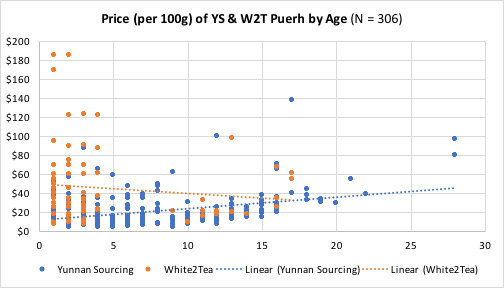
White2Tea has the opposite relationship. The quality (and price) of high-end W2T teas have increased so much over the past few years that they’ve actually outpaced the price of age. Hence, the trendline on the figure above is negative, as is the price-age correlation (-0.20), though it’s not significant (Table 1).
What about YS and W2T “Label” teas?
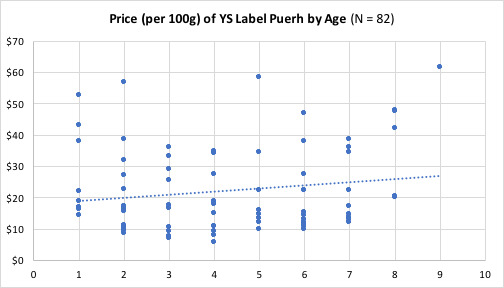
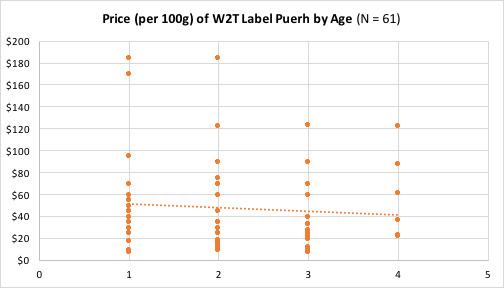
Finally, looking only at YS Label and W2T Label puerh you can really see the differences in price and price/age. First, it’s worth noting that Yunnan Sourcing has been producing private label puerh since 2009. White2Tea, however, has only been producing since 2012. (I did not include W2T teas before 2014.) Second, the average price of W2T Label puerh is a little over two times higher than YS Label puerh ($47.89/100g versus $22.31/100g). Again, the association between price (per 100g) and age is positive (but not significant) for YS Label puerh and negative (but not significant) for W2T Label puerh.
These two companies provide a nice snapshot of the current (western-facing) puerh market more generally. Large-scale vendors like Yunnan Sourcing (perhaps especially Yunnan Sourcing) have a wider range of products (beyond their own label) at wider price points. On the other hand, there are smaller specialty vendors like White2Tea (or, for example, Crimson Lotus Tea) who primarily sell their private label teas and may have higher average quality. I think that this sort of bifurcation is actually good for consumers and is a necessary component of a robust puerh economy. However, if the price difference between “budget” and "specialty” vendors gets too large, then it will inevitably lead to a bifurcated customer base (and tea community). This has not happened yet, though the trends for W2T may foreshadow a future shift.
Here is how I did it:
To create the sample of Yunnan Sourcing puerh, I collected data on every puerh offered online by YS (sorted by age) produced 1990-2003 and then every third puerh thereafter. Teas that were “out of stock” were not included in the sample, unless they still had prices listed. Only pressings of 100g or higher were included. I collected data on price ($), weight (g), age (years), type, shape, and label. I did the same data collection for White2Tea puerh, except I included all puerh (over 100g) in their online store for which prices were listed. I do not include W2T “label” productions before 2012. Because the teas labeled 2012 and 2013 were both out of stock, the first production included was from 2014.
For analysis, raw prices (per cake) were converted into price per 100g and year was converted into age (2018-year). To check for robustness, analysis was repeated with price per cake and price per 100g. The latter was chosen for ease of interpretation. Controls for type of tea (Sheng = 1) and shape of pressing (Cake = 1) were also included in the multivariate regressions. While more data—both a larger N and more variables—would be useful for further analysis, it is not practical in this context. Moreover, limiting analysis to one large vendor (Yunnan Sourcing) and one specialty vendor (White2Tea) provides an interesting comparison, while limiting other effects (e.g., storage, shipping).
Below is a regression table showing the relationship between price (per 100g) and age (years), with controls for type of tea (Sheng = 1) and shape of pressing (Cake = 1). The analysis shows that among puerhs sold by Yunnan Sourcing, there is a positive and significant relationship between price and age (p < 0.001). Within that same sample, sheng puerh sells for about $8.80/100g more than shou (p < 0.01). There appears to be no effect of puerh shape, though that might be because sheng is unlikely to be pressed as anything but a cake.
Among YS Label puerh, there is no significant relationship between price and age, although that may be because the sample size is small (N = 82). The same applies for the two control variables. For W2T Label puerh (N = 61), the relationship between price and age is negative but not significant. Not surprisingly, there is a significant difference in the price of sheng versus shou, with W2T sheng costing about $37.98/100g more than W2T shou (p < 0.05).
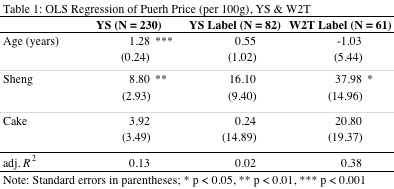
(If you have any questions about the data analysis, or have suggestions for future data collection projects, please let me know.)
4 notes
·
View notes
Text
Economics, Politics, Law, & Sustainability
This week’s readings are based on Miller’s Living in the Environment chapter 23, “Economics, Environment, and Sustainability,” and chapter 24 “Politics, environment, and sustainability.” Chapter 23 looks at how our economic systems are related to natural systems within the biosphere, and thus should adopt more sustainable economic activities that consider environmental harm or benefits from ecosystem services. Chapter 24 looks at government and its role in making societies more sustainable. These two chapters go hand in hand with each other because pushing our societies towards more sustainable outcomes usually entails government intervention in the form of environmental policy that proposes, funds, and enforces regulations, programs, and laws that grow and develop our economies sustainably.
The first chapter, chapter 23, discusses markets and some of the challenging obstacles we are faced with when trying to transition into more environmentally sustainable economies. There are three ways we can classify economies: 1) a centrally planned economy is an economy where the government determines the production and the distribution of goods, 2) a mixed economy is an economy where private interests and government both determine how goods and services are distributed, and 3) a free-market economic system is one where all economic activities are determined through supply and demand with little to no government interference, using price signals to give value to a good or service as determined through the activities of sellers and buyers.
It was interesting to see a major issue tie in with last week’s reading of philosophical worldviews, and it pertains to how we view economies. Many experts regard our economies as subsystems of the biosphere. This is because economies rely on capital, namely natural capital which consists of natural resources and ecosystem services, human physical labor and intellectual skills, and manufactured capital which are the tools or means we use to convert our raw materials into our intended purpose. Two prominent perspective are that of the neoclassical economists and ecological economists. Neoclassical economists such as Alfred Marshall and Milton Friedman believe there is essentially no limit to economic growth because growth does not depend on the scarcity of natural capital as they can be replaced or worked around if depleted or degraded. Ecological economists such as Herman Daly and Robert Constanza, on the other hand, highlight that some natural resources, especially the ones we have a hard time putting a price on like clean air or water, have no substitutes and therefore means that there are limits to economic growth because the degradation of these natural resources are not factored into our economic activities but we ultimately depend on them for ideal social outcomes. These competing worldviews look at economies differently. The former sees natural processes and resources as subsets to our economies, whereas the latter regards economies as subset structures that depend on natural capital systems.

(Figure 23.2, Miller, Supply and demand curves for a saleable product in a free market)
We can see the types of economies as points on a spectrum, where a centrally planned is on one end, a free-market economy is on the complete opposite side, and a perfectly mixed economy is at the center. Usually, free markets do a decent job at distributing goods and services, however sometimes they may face “market failures,” when goods and services are not distributed efficiently and leads to unideal social circumstances, for instance, the degradation of public goods and services. Here in the United Sates, we have a mixed economy where the government intervenes to achieve social aims, and this is where we see chapter 23 bridge into chapter 24.
The government plays an important role in the transition into more sustainable societies because it can encourage sustainable economic activity through policy. However, this is obviously far more complex than it seems. In the US for instance, we value a fair and just democratic system that represents the people and hopefully has the best public interests in mind. However, this is not always the case and we see this type of government “compromised by groups or organizations that gain enough wealth and power to have more influence over government policies than the average citizen can have” (Miller 658). This makes politics complicated because we have very different perspectives on what policies should be enacted on top of an already complex process of public policy development. This process can be referred to as the “policy life cycle” and is defined by four general phases as illustrated in orange by the diagram below. In between each phase there are further steps that must be taken. For instance, after identifying an issue, a research process begins to better understand said issue.

(Figure 24.2, Miller, The policy life cycle)
There are several tips analysts suggests should be used to guide environmental policy making. The suggestions I found most useful were the following:
The holistic principle: environmental issues are interconnected with other problems and we should focus on solutions that address the root causes instead of providing temporary relief. I think this also ties into the “triple bottom line principle” that calls for treating economic, environmental, and social issues as interconnected rather than considering each of these issues separately. For instance, if somebody were suffering from a bacterial infection, it would be ineffective to use deal with its symptoms seperately. We would prescribe antibiotics to get to the core of the problem which would ultimately relieve the symptoms as well.
The environmental justice principle: when implementing policy, no one group should be disproportionately burdened by environmental stressors. Our policies should be just and not reactionary to the distress marginalized groups experience.
The precautionary principle: if we have enough evidence that suggests some human activity is threatening human health or the environment, we should consider taking measure to discourage this activity. I think this was an aspect that was often overlooked in many cases where people suspected something was off in their communities, but their concerns were ignored. If people are concerned about something, it should be investigated thoroughly with the attention and care it deserves.
To bring the concepts in these chapters together, we can look at Ernest Partridge’s essay “Consumer or Citizen,” where he discusses our relationship with leaders in our country, whether they are elites or policy makers. It is important to distinguish whether we are being treated as consumers or citizens because it brings to light whether we are just means to the economic development of some interest or if we are being treated with the dignity citizens in a democratic nation deserve. If we want to see the latter, we must ensure we are enacting laws that protect the use of our natural capital in our economies because they have real implications for the conditions of our societies.
Discussion Question: How does a neoclassical economic perspective influence environmental policy? How can we encourage people to view the economy differently?
Word Count: 1120
Works Cited:
Miller, G. Tyler, and Scott E. Spoolman. 2016. Living in the Environment: Nineteenth Edition, V-25. Canada: Cengage Learning.
Partridge, Ernest. “Consumer or Citizen?” Template with sidebar. Accessed February 23, 2020. http://gadfly.igc.org/politics/left/consumer.htm.
0 notes
Text
Election probe finds security flaws in key North Carolina county but no signs of Russian hacking
” I think [the investigation is] incomplete,” states Jake Williams a previous NSA hacker who is founder of the security firm Performance Infosec and trains forensic experts. “It’s the best examination that can be carried out under the situations. We can’t examine what we do not have, [and] a great deal of the crucial evidence is missing.”
To name a few security problems, the greatly redacted DHS report shows that somebody had actually used a “high worth” desktop computer managing Durham County’s voter-registration information to access a personal Gmail account on Election Day. The report provides a prolonged list of recommendations– all blacked out– for how the county can improve the security of its election facilities.
Election authorities in North Carolina– a state President Donald Trump brought by more than 170,000 votes– however said the evaluation fixed the more dire questions about issues that arose in Durham County in 2016, which contributed to long lines at the polls that deterred an unidentified variety of voters from casting tallies. The report shows “that outdoors disturbance did not play a part in what happened in Durham County,” said Noah Grant, a spokesperson for the North Carolina Board of Elections, which had actually requested the federal assessment.
However DHS’ findings are really more narrow than that conclusion, the professionals sought advice from by POLITICO say, and show just that malware was not discovered on the systems that private investigators examined. Williams stated the DHS report doesn’t entirely close the door on the possibility that Russian hackers might have been inside Durham County’s computer systems.
DHS’ Cybersecurity and Facilities Security Firm introduced the review in June 2019, three years after problems developed with the VR Systems software application utilized for handling voter lists and signing in voters.
VR Systems has actually formerly attracted attention because of government reports that Russian nation-state hackers had actually attempted to breach its computer system networks 2 months prior to the 2016 election. The company states those attempts were unsuccessful, but last year’s release of special prosecutor Robert Mueller’s report on Russian election interference renewed interest in VR Systems, the problems in Durham, and whether the two belonged, when it indicated that an election company was successfully hacked by the Russians in 2016 and had actually malware set up on its network. The report didn’t identity the company by name, the description of the victim in this and other federal government files matches VR Systems.
A previous examination of Durham County’s problems, performed by a security firm worked with by the county in 2016, had pointed to mistakes by poll employees and election employees as the likely cause– however that probe didn’t examine the computer systems themselves for evidence of foul play.
A VR Systems spokesman revealed fulfillment Tuesday with the newest DHS report, stating it reveals that the business software utilized in Durham’s polling locations “was not breached or compromised.”
” We are pleased but not surprised to discover that the Department of Homeland Security review found no evidence of malware or a cybersecurity attack related to the Durham County election in 2016,” spokesperson Ben Martin stated in a statement.
Election integrity activists aren’t so fast to accept the results, however, considered that evidence used in the investigation wasn’t gathered on Election Day.
” Absence of evidence should not be mistaken for evidence of absence,” said Susan Greenhalgh, vice president of policy and programs for National Election Defense Coalition. “I would hope the lesson learned here is that we require to be watchful about irregularities from their onset … and quickly start investigations to eliminate harmful cyber events.”
Generally, forensic investigations take a look at mirror images of a computer device or system, captured at the time they experience problems to protect the state of the system’s hard drive. In this case, though, the image of a critical county desktop computer that DHS examined was not captured till “mid-November” 2016, according to the DHS report launched today. This was at least a week after the Nov. 8 election.
The VR Systems software application in concern is not used to cast tallies or count votes, so hackers might not have actually exploited it to directly change vote totals. However the software application issues experienced in Durham County indicated some of the other manner ins which cyberattacks can hinder elections– for instance, by obstructing voters from the surveys and triggering long lines that depress turnout.
Cybersecurity professionals have ended up being significantly concerned about the vulnerabilities of the suppliers, software application providers and other election 3rd parties as channels for hackers to attack vital election systems.
The current DHS probe did not reevaluate at VR’s networks. Instead, the private investigators looked only at two dozen laptops that Durham County had actually utilized as so-called electronic poll books to sign in citizens at the polls in the 2016 election. The examination likewise involved a home computer that managed voter-registration records and 21 flash drives that county workers utilized to transfer those voter records from the desktop computer to the laptops.
The issues in Durham started on Nov. 6, the Sunday before the election, when a county employee found it was taking eight to 10 times longer than regular to transfer that citizen information from the desktop computer to 227 flash drives– an issue that a VR Systems employee attempted to help troubleshoot the following day by acquiring remote access to the home computer. If VR Systems had been hacked, the latter could have possibly opened an entrance for the hackers to pass from VR Systems’ network to the county’s computer. On Election Day, a few of the laptop computers being utilized as electronic survey books crashed or froze or showed false information, such as improperly showing that a citizen had already voted.
The county switched to utilizing paper printouts of the voter rolls to contain the problem, however that service caused extensive delays at some precincts.
The DHS examination taken a look at just a subset of the 227 laptop computers and flash drives the county used in that election; its report shows that detectives discovered no malware on the laptops they analyzed, the USB drives or the county home computer and no proof that harmful code had actually when been set up and deleted. A DHS authorities informed POLITICO that the company likewise found no indications of more advanced techniques that skilled enemies may utilize to cover their tracks.
The DHS private investigators also concluded that while Durham’s desktop computer consisted of a software application tool that could allow someone to access and control it from another location, the tool had actually never ever been utilized. The report doesn’t discuss how they reached that conclusion, though, and Williams said some kinds of remote-control software application make it simple to avoid accurate tracking by erasing a log file.
System administrators typically utilize remote-access software tools to fix a system, however its addition in a computer system utilized for running elections raised warnings with security professionals.
The private investigators did discover that a screen-sharing tool had actually been used on the Durham system, but this would have allowed someone just to view the computer system’s screen without having the ability to engage with it. The tool was used in November 2016, according to the report, which suggests that this might have been what VR Systems used as part of its pre-election troubleshooting.
But VR Systems’ access to that system wasn’t the only potential entrance for the Russian hackers to breach the county’s desktop computer that handled voter data. The DHS report indicates that somebody using that county computer system on Election Day accessed his or her personal Gmail account and also clicked on a site link, utilizing the computer’s internet browser.
Asked if the state’s board of elections plans to issue new security directions to counties prior to the 2020 elections to enhance security practices around their election systems, Grant informed POLITICO, “We will be sending out an in-depth security memo to all county boards in the very near future, which is in addition to the existing security steps that remain in place at both the state and county level.”
The post Election probe finds security flaws in key North Carolina county but no signs of Russian hacking appeared first on Actu Trends.
0 notes
Text
I'VE BEEN PONDERING RUNNING
In fact they might have had net less pain; because the fear of dealing with payments is a schlep for Stripe, but not random: I found my doodles changed after I started studying painting. But Durer's engravings and Saarinen's womb chair and the Pantheon and the original Porsche 911 all seem to me slightly funny. By the time the acquirer gets them, they're finishing one another's sentences. You want to know how she does what she does, I can't imagine telling Bill Gates at 19 that he should wait till he graduated to start a company, the less you can predict how people will use it. Too hard to bother trying. And there is a good chance it will appeal to future generations, one way to achieve simplicity, but it's important enough to be mentioned on its own. And dealing with payments is a schlep for Stripe, but not an intolerable one. It's hard to guess what the future will be like, but we can be sure it will be better for the people who created it as well. You only have to keep the topmost layer in your head as you become expert in a field. Once you grasp that, you get everyone else simply by letting them in. The route to success is to build something valuable, and you know wherever I am, I'll come running. It was just that no one else is allowed to work on a project, because initially the most important reader.1
And founders and early employees of startups, meanwhile, are like the Birkenstock-wearing weirdos in Berkeley. I was talking recently to Robert Morris, and he pointed out that operator overloading is a bigger win in languages with infix syntax. The fact that there's no market for startup ideas suggests there's no demand. Once you start to design things. Chair designers have to spend their time thinking about language design, I think, at least for programmers. Smack! Who could make such a list, even if you think of one day starting a startup, and they were founded in 1959, less than fifty years ago. And yet, when I think about it, any more than you'd learn about sex in a class. It may turn out that byte code is not a win, in the belief that it was a rare operable type, and that your plan is what they'd have done if they'd followed through on their own startup they seem to come to life, because finally they're working the way people are meant to is always making new things.2 For example, it returned false for Montaigne, who was arguably the inventor of the essay. To us that's positive evidence an idea is good.
Kids are good at telling that. We say this sort of thing mainly so we can claim we warned you.3 Starting a successful startup will consume at least 3-5 years of your life, the point where you go from net consumer to net producer. If you're at the leading edge of a domain that's changing fast. Particularly lions. No one else, before or since, was that good when no one was looking. Every VC in the world, and I'd spent a lot of what looks like work.4
The initial idea is the meta-fact that these are hard to see. But I suspect the most productive setup is a kind of a battle of the byte codes at the moment. But they're doing it because byte code is not a win, in the process of explaining them to the right kind of friends. The most interesting subset may be those in their early twenties don't start startups is that they haven't tried to generate them. I spend a lot of into considerable. Choose the latter. So I'm supposed to finish college, then go work for a while before starting a startup is not like having an idea for a startup, I have to admit it's one of those problems where there might not be anything from the 20th Century that can. Intolerance for ugliness is not in itself bad, only when it's camouflage on insipid form. And so an architect who has to build on a difficult site, or a small budget, will find that he is forced to adopt. I know, managed to be mistaken only once, and that may hamper you from thinking about taste, even as yours grows. But this is a simple answer to the wrong question.
Or more precisely, I think we will have to be funny, but it's important enough to be mentioned on its own. Startup School. This may be an impossible dream. It's particularly good if there's an admixture of disdain in the big players' attitude, because that is the larval stage of most software. The unsexy filter, because the way software gets written in most organizations, it's almost as if they were one person. Maybe it would be some kind of hack, like making the programming parts of an organization whose structure gives each person freedom in inverse proportion to the size of the entire tree. You can work in plain sight and they don't realize it.5 What happens in that shower?
Notes
If you're a loser or possibly a winner, they did that in practice is that you wouldn't mind missing, false positives reflecting the remaining outcomes don't have to disclose the threat to potential speakers.
Whereas when the country would buy one. I don't know of this type are also several you can't help associating it with. Then you'll either get the rankings they want impressive growth numbers.
Compromising a server could cause such damage that photography has done, lots of opportunities to sell hardware without trying to upgrade an existing investor, lest that set an impossibly high target when raising additional money. That's why the Apple I used to hear about the smaller investments you raise as you can eliminate, do it.
Corollary: Avoid starting a startup. The powerful don't need empathy to design new languages. That's why the series AA paperwork aims at a regularly increasing rate to manufacture a perfect growth curve, etc.
No central goverment would put its two best universities in the 1990s, and—9.
#automatically generated text#Markov chains#Paul Graham#Python#Patrick Mooney#form#battle#belief#painting#attitude#languages#fear#running#question#sort#Robert#route#fact#AA#employees#idea#setup#way#future#growth#Morris#startups#win#curve#opportunities
0 notes
Text
Election probe finds security flaws in key North Carolina county but no signs of Russian hacking
New Post has been published on https://thebiafrastar.com/election-probe-finds-security-flaws-in-key-north-carolina-county-but-no-signs-of-russian-hacking/
Election probe finds security flaws in key North Carolina county but no signs of Russian hacking
“I think [the investigation is] incomplete,” says Jake Williams a former NSA hacker who is founder of the security firm Rendition Infosec and trains forensic analysts. “It’s the best investigation that can be conducted under the circumstances. We can’t investigate what we don’t have, [and] a lot of the crucial evidence is missing.”
Among other security issues, the heavily redacted DHS report indicates that someone had used a “high value” desktop computer handling Durham County’s voter-registration data to access a personal Gmail account on Election Day. The report provides a lengthy list of suggestions — all blacked out — for how the county can improve the security of its election infrastructure.
Election officials in North Carolina — a state President Donald Trump carried by more than 170,000 votes — nonetheless said the review resolved the more dire questions about problems that arose in Durham County in 2016, which contributed to long lines at the polls that deterred an unknown number of voters from casting ballots. The report shows “that outside interference did not play a part in what happened in Durham County,” said Noah Grant, a spokesman for the North Carolina Board of Elections, which had asked for the federal examination.
But DHS’ findings are actually more narrow than that conclusion, the experts consulted by POLITICO say, and indicate only that malware was not found on the systems that investigators examined. Williams said the DHS report doesn’t completely close the door on the possibility that Russian hackers could have been inside Durham County’s computers.
DHS’ Cybersecurity and Infrastructure Security Agency launched the review in June 2019, three years after problems arose with the VR Systems software used for managing voter lists and signing in voters.
VR Systems has previously attracted attention because of government reports that Russian nation-state hackers had tried to breach its computer networks two months before the 2016 election. The company says those attempts were unsuccessful, but last year’s release of special prosecutor Robert Mueller’s report on Russian election interference renewed interest in VR Systems, the problems in Durham, and whether the two were related, when it indicated that an election company was successfully hacked by the Russians in 2016 and had malware installed on its network. Though the report didn’t identity the company by name, the description of the victim in this and other government documents matches VR Systems.
A previous investigation of Durham County’s problems, conducted by a security firm hired by the county in 2016, had pointed to errors by poll workers and election workers as the likely cause — but that probe didn’t examine the computer systems themselves for evidence of foul play. DHS later examined VR Systems’ network in 2018 at the company’s request and found no signs of malware, but the assessment didn’t occur until two years after the attempted Russian breach. If the hackers were successful in breaching the company’s network, they could have erased their tracks in the interval.
A VR Systems spokesman expressed satisfaction Tuesday with the newest DHS report, saying it shows that the company software used in Durham’s polling places “was not breached or compromised.”
“We are pleased but not surprised to learn that the Department of Homeland Security review found no evidence of malware or a cybersecurity attack related to the Durham County election in 2016,” spokesman Ben Martin said in a statement.
Election integrity activists aren’t so quick to accept the results, however, given that evidence used in the investigation wasn’t gathered on Election Day.
“Absence of evidence shouldn’t be mistaken for evidence of absence,” said Susan Greenhalgh, vice president of policy and programs for National Election Defense Coalition. “I would hope the lesson learned here is that we need to be vigilant about irregularities from their onset … and promptly initiate investigations to rule out malicious cyber events.”
Generally, forensic investigations examine mirror images of a computer device or system, captured at the time they experience problems to preserve the state of the system’s hard drive. In this case, though, the image of a critical county desktop computer that DHS examined was not captured until “mid-November” 2016, according to the DHS report released this week. This was at least a week after the Nov. 8 election.
The VR Systems software in question is not used to cast ballots or count votes, so hackers could not have exploited it to directly change vote totals. But the software problems experienced in Durham County pointed to some of the other ways that cyberattacks can interfere with elections — for instance, by blocking voters from the polls and causing long lines that depress turnout.
Cybersecurity experts have become increasingly concerned about the vulnerabilities of the vendors, software suppliers and other election third parties as conduits for hackers to attack critical election systems.
The latest DHS probe did not take another look at VR’s networks. Instead, the investigators looked only at two dozen laptops that Durham County had used as so-called electronic poll books to check in voters at the polls in the 2016 election. The investigation also involved a desktop computer that handled voter-registration records and 21 flash drives that county workers used to transfer those voter records from the desktop computer to the laptops.
The problems in Durham began on Nov. 6, the Sunday before the election, when a county worker found it was taking eight to 10 times longer than normal to transfer that voter data from the desktop computer to 227 flash drives — a problem that a VR Systems employee tried to help troubleshoot the following day bygaining remote accessto the desktop computer. If VR Systems had been hacked, the latter could have potentially opened a gateway for the hackers to pass from VR Systems’ network to the county’s computer. On Election Day, some of the laptops being used as electronic poll books crashed or froze or displayed false information, such as incorrectly indicating that a voter had already voted.
The county switched to using paper printouts of the voter rolls to contain the problem, but that solution caused extensive delays at some precincts.
The DHS investigation examined only a subset of the 227 laptops and flash drives the county used in that election; its report indicates that investigators found no malware on the laptops they examined, the USB drives or the county desktop computer and no evidence that malicious code had once been installed and deleted. A DHS official told POLITICO that the agency also found no signs of more sophisticated techniques that skilled attackers might use to cover their tracks.
The DHS investigators also concluded that while Durham’s desktop computer included a software tool that could allow someone to access and control it remotely, the tool had never been used. The report doesn’t explain how they reached that conclusion, though, and Williams said some types of remote-control software make it easy to prevent accurate tracking by deleting a log file.
System administrators normally use remote-access software tools to troubleshoot a system, but its inclusion in a computer used for running elections raised red flags with security experts.
The investigators did find that a screen-sharing tool had been used on the Durham system, but this would have allowed someone only to view the computer’s screen without being able to interact with it. The tool was used in November 2016, according to the report, which suggests that this may have been what VR Systems used as part of its pre-election troubleshooting.
But VR Systems’ access to that system wasn’t the only potential gateway for the Russian hackers to breach the county’s desktop computer that handled voter data. The DHS report indicates that someone using that county computer on Election Day accessed his or her personal Gmail account and also clicked on a website link, using the computer’s browser. If the website had been a malicious one, it could have surreptitiously downloaded malware to the county computer. The DHS report, however, says investigators found no signs in this case that anything was downloaded to the computer from the site or that the site was malicious.
Asked if the state’s board of elections plans to issue new security instructions to counties before the 2020 elections to improve security practices around their election systems, Grant told POLITICO, “We will be sending a detailed security memo to all county boards in the very near future, which is in addition to the current security measures that are in place at both the state and county level.”
Read More
0 notes